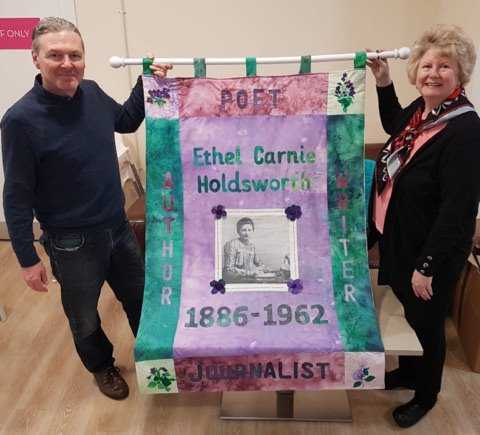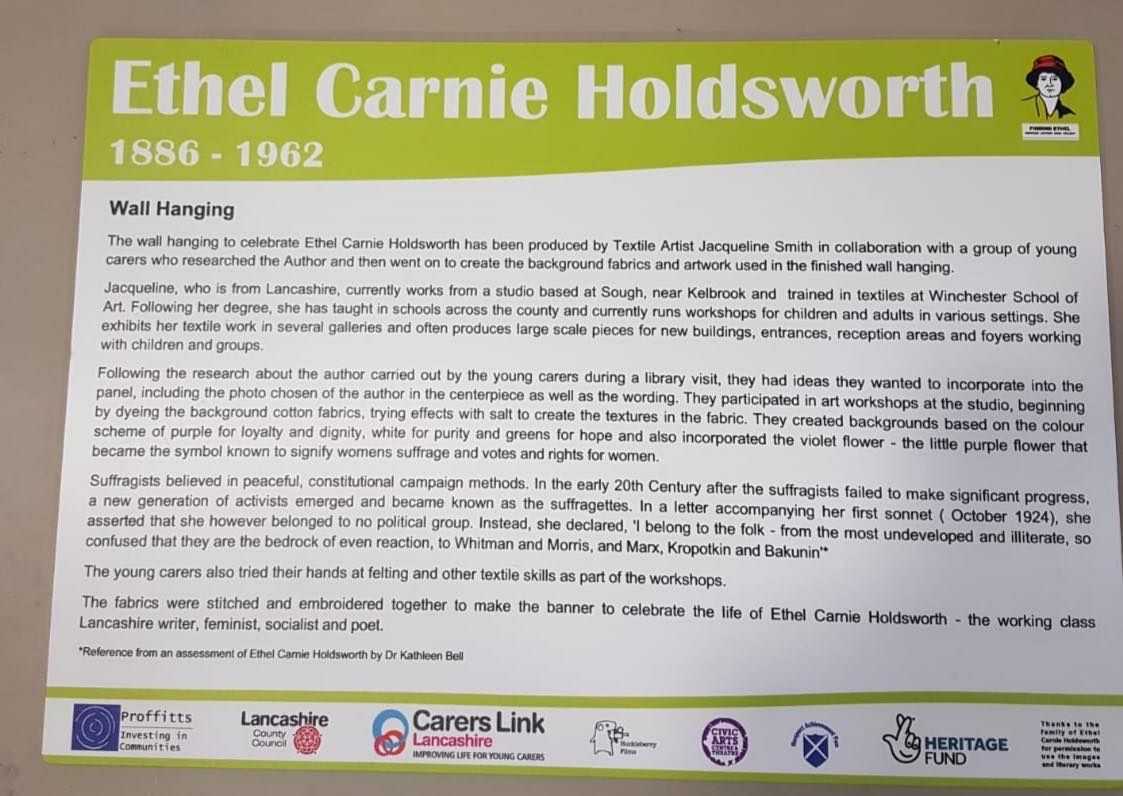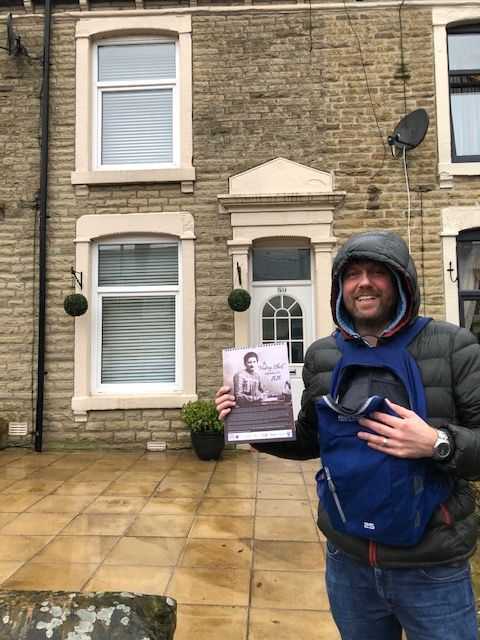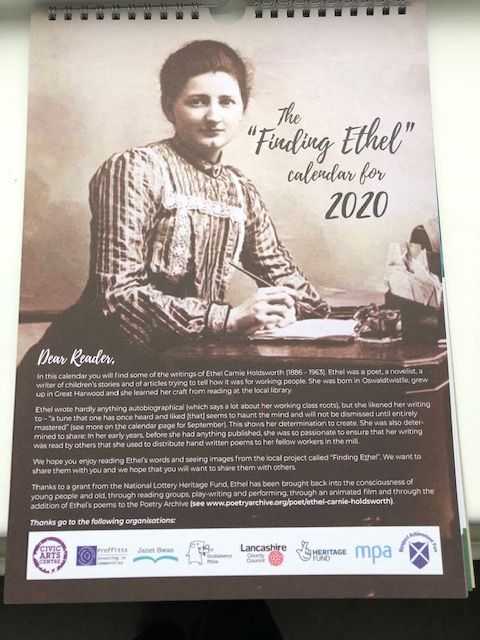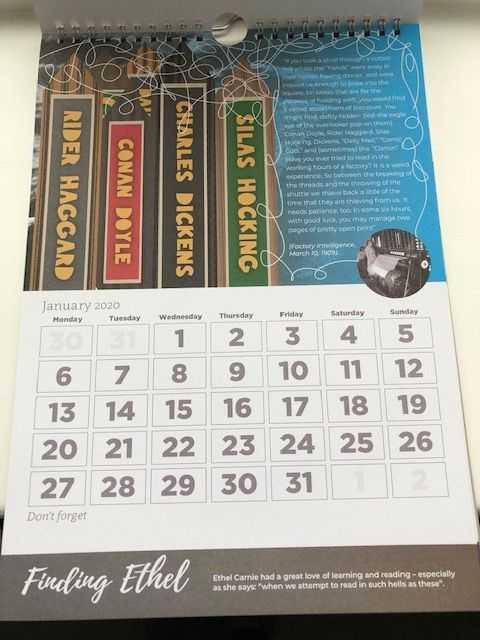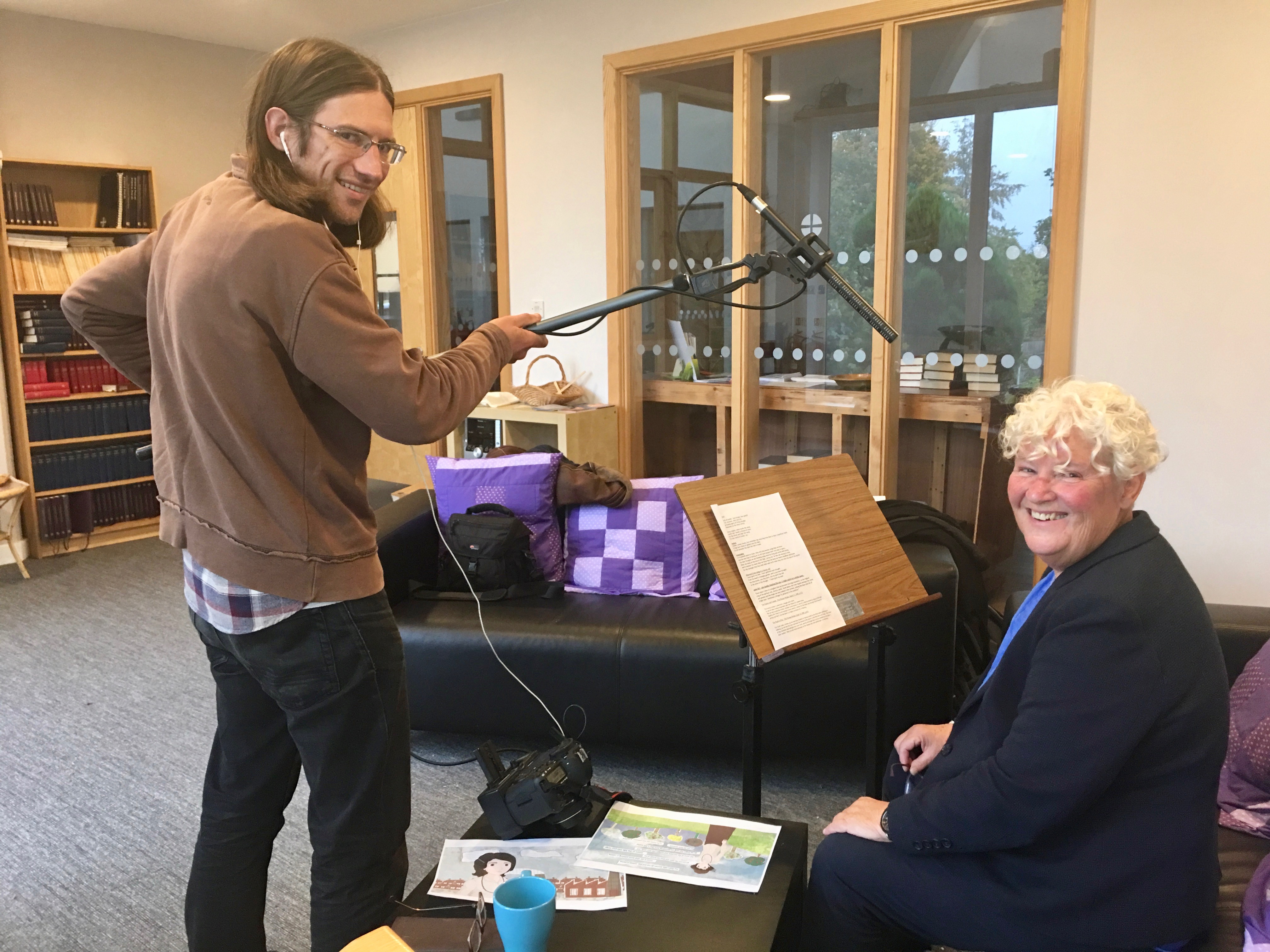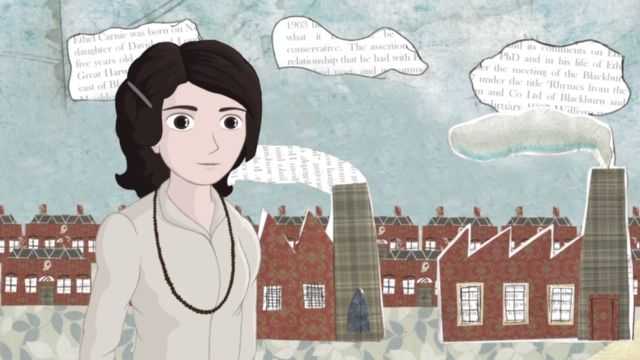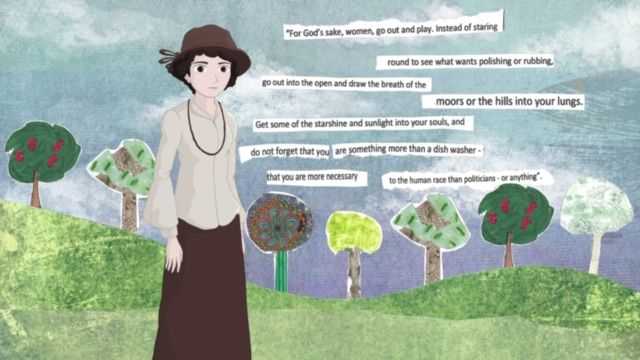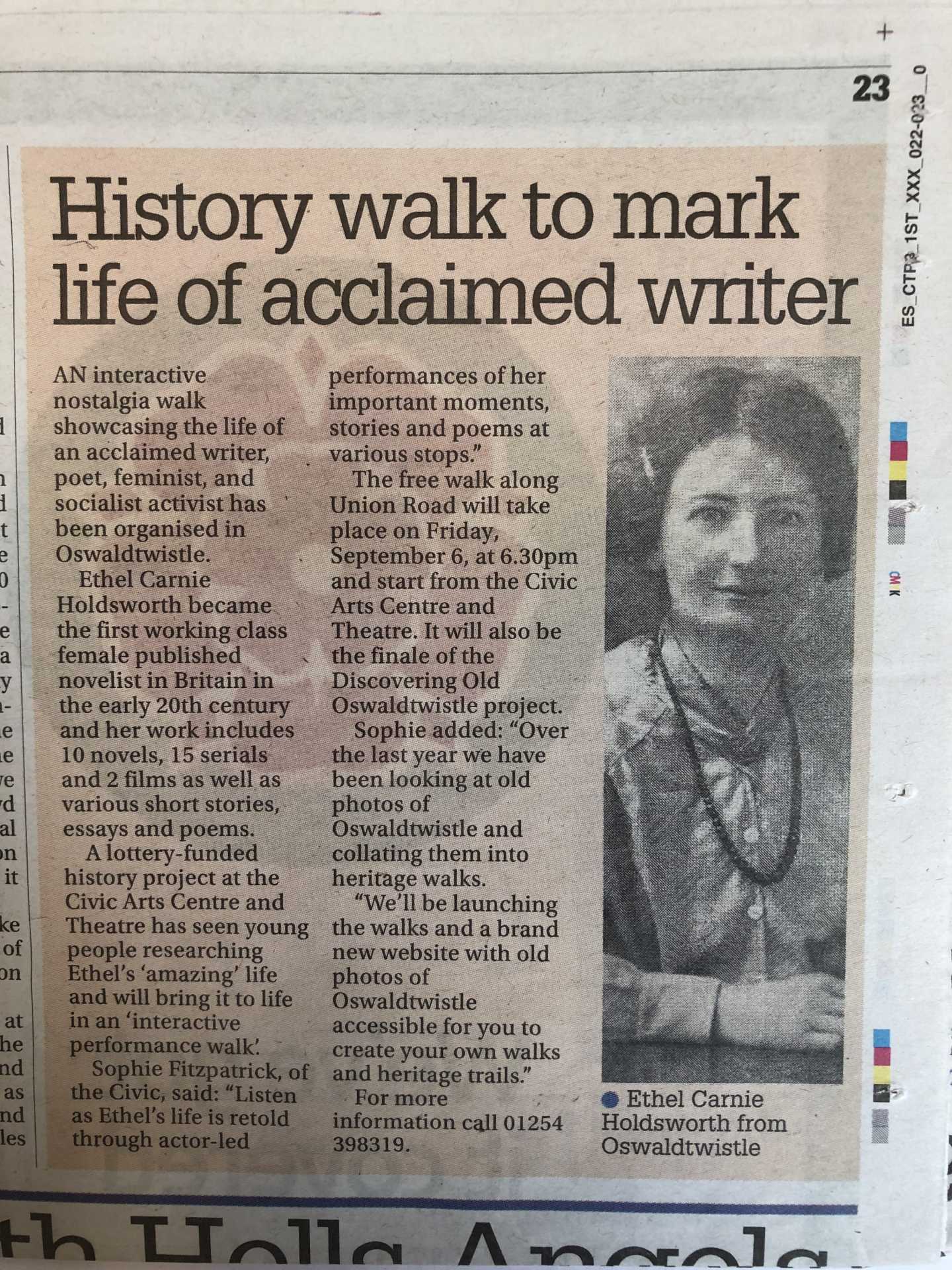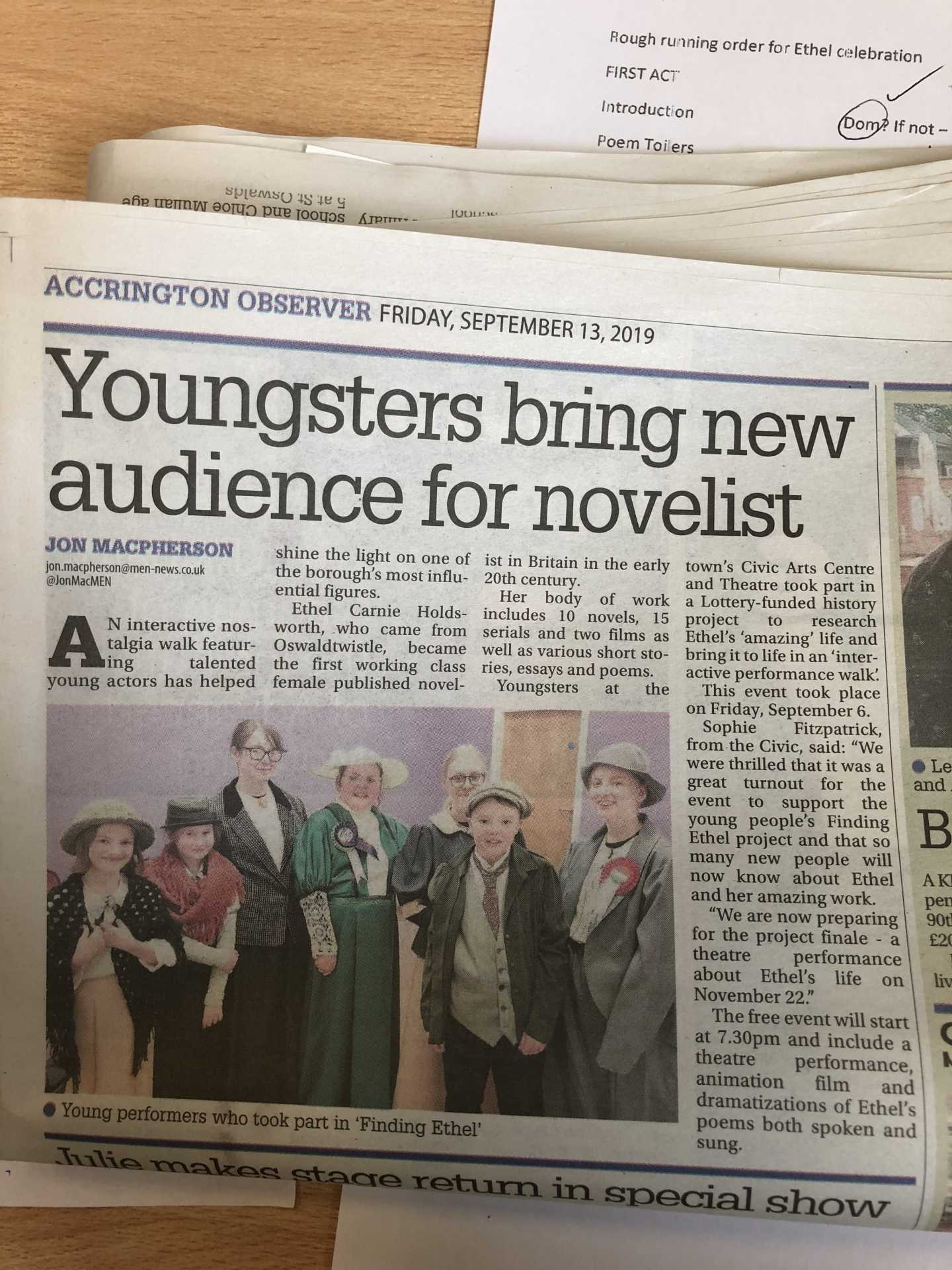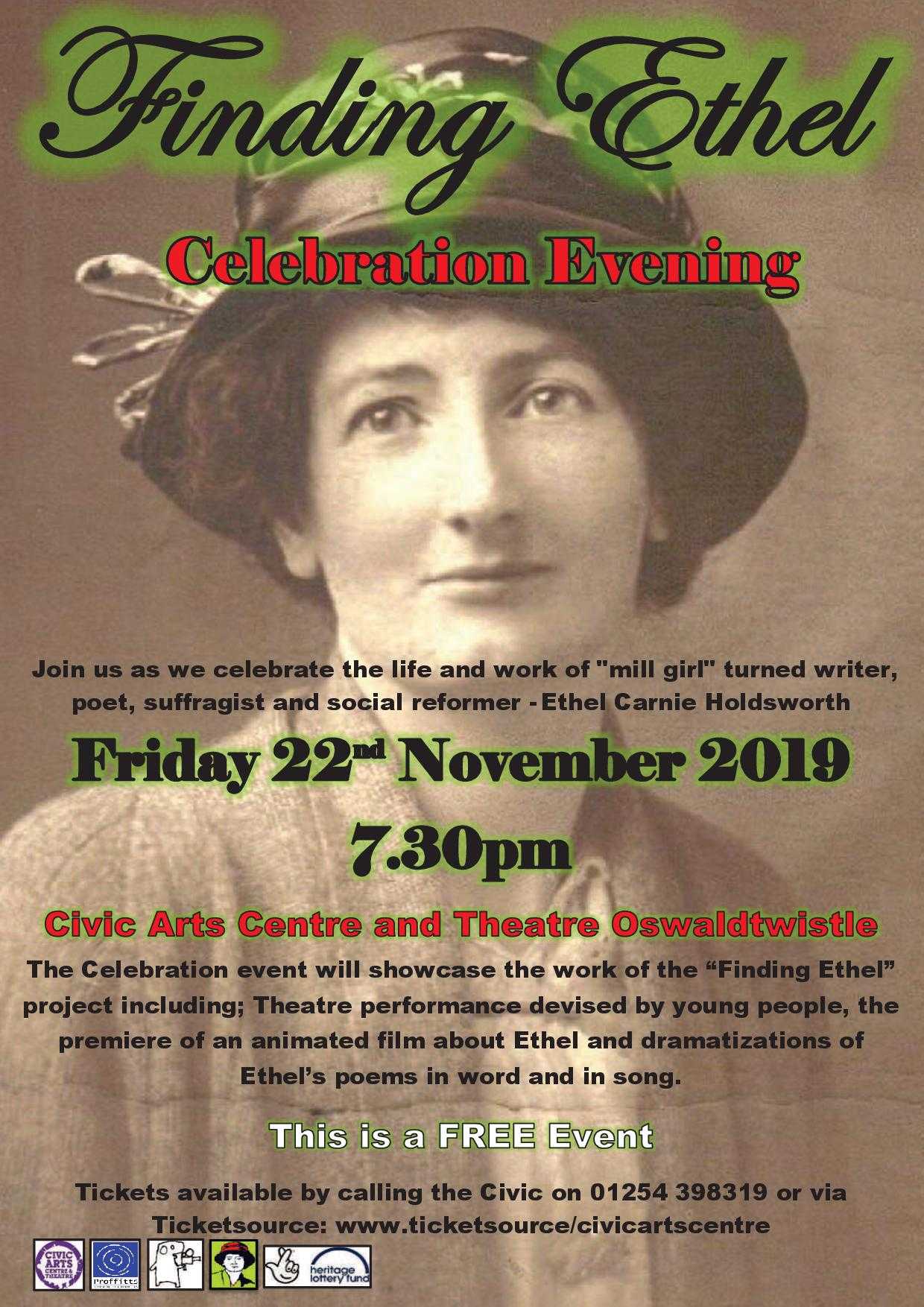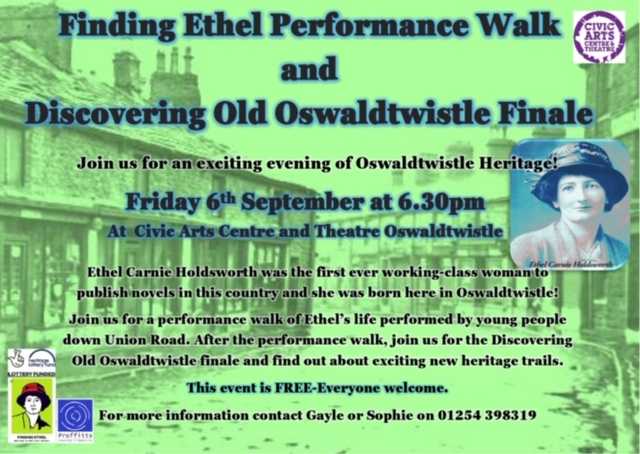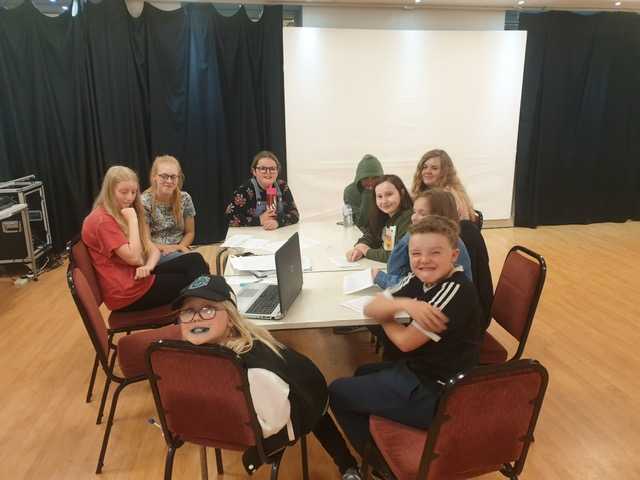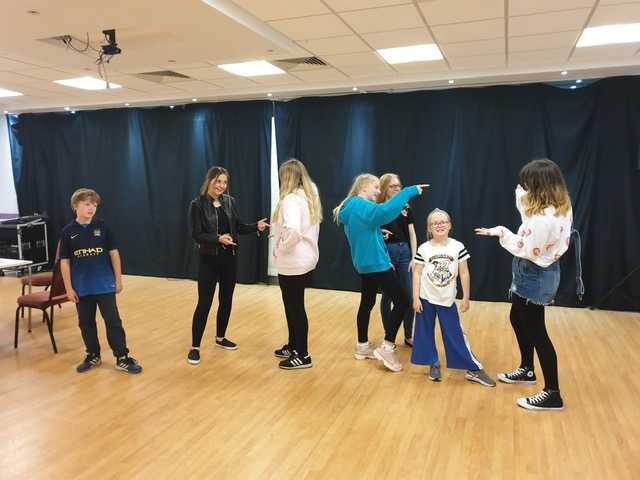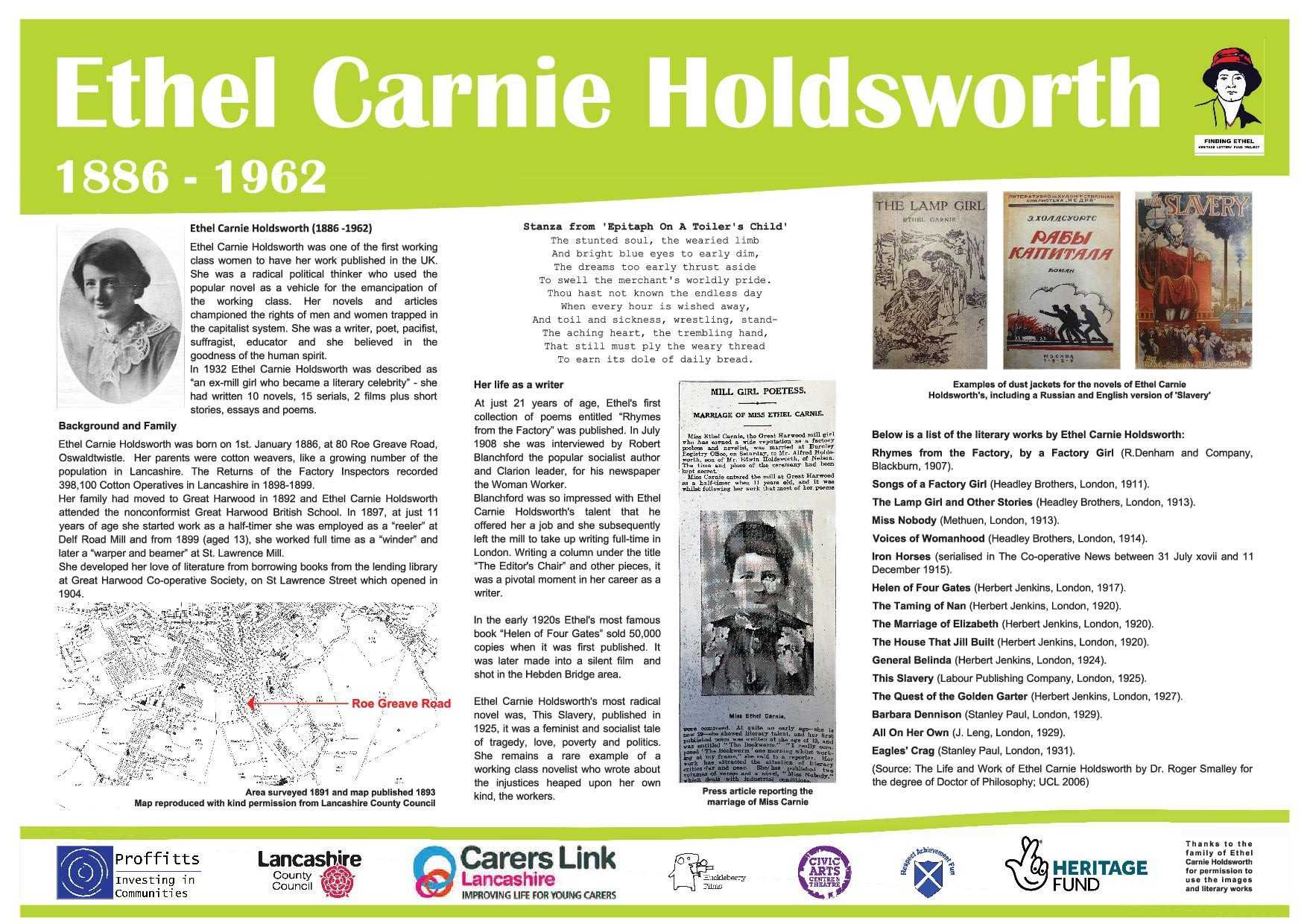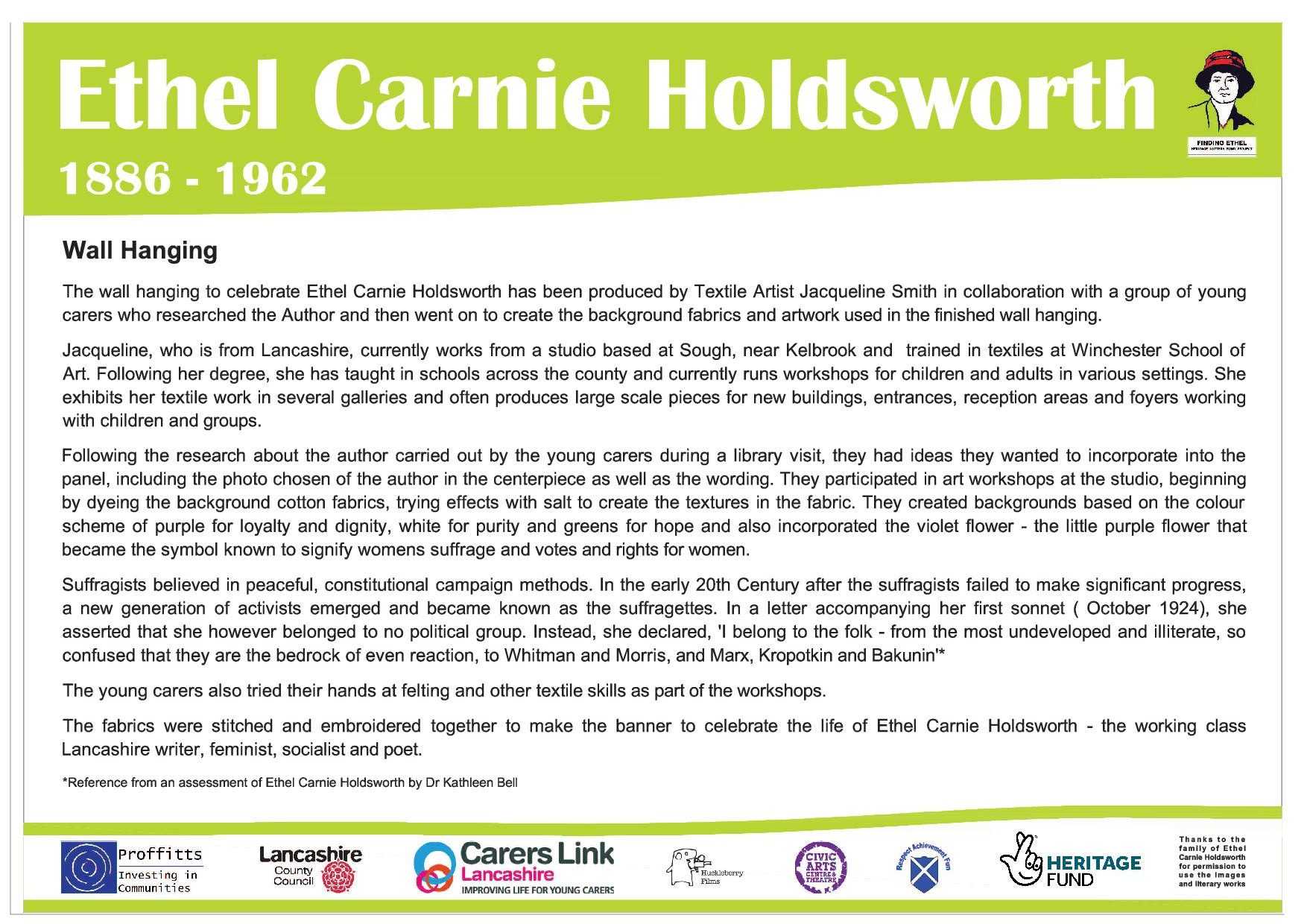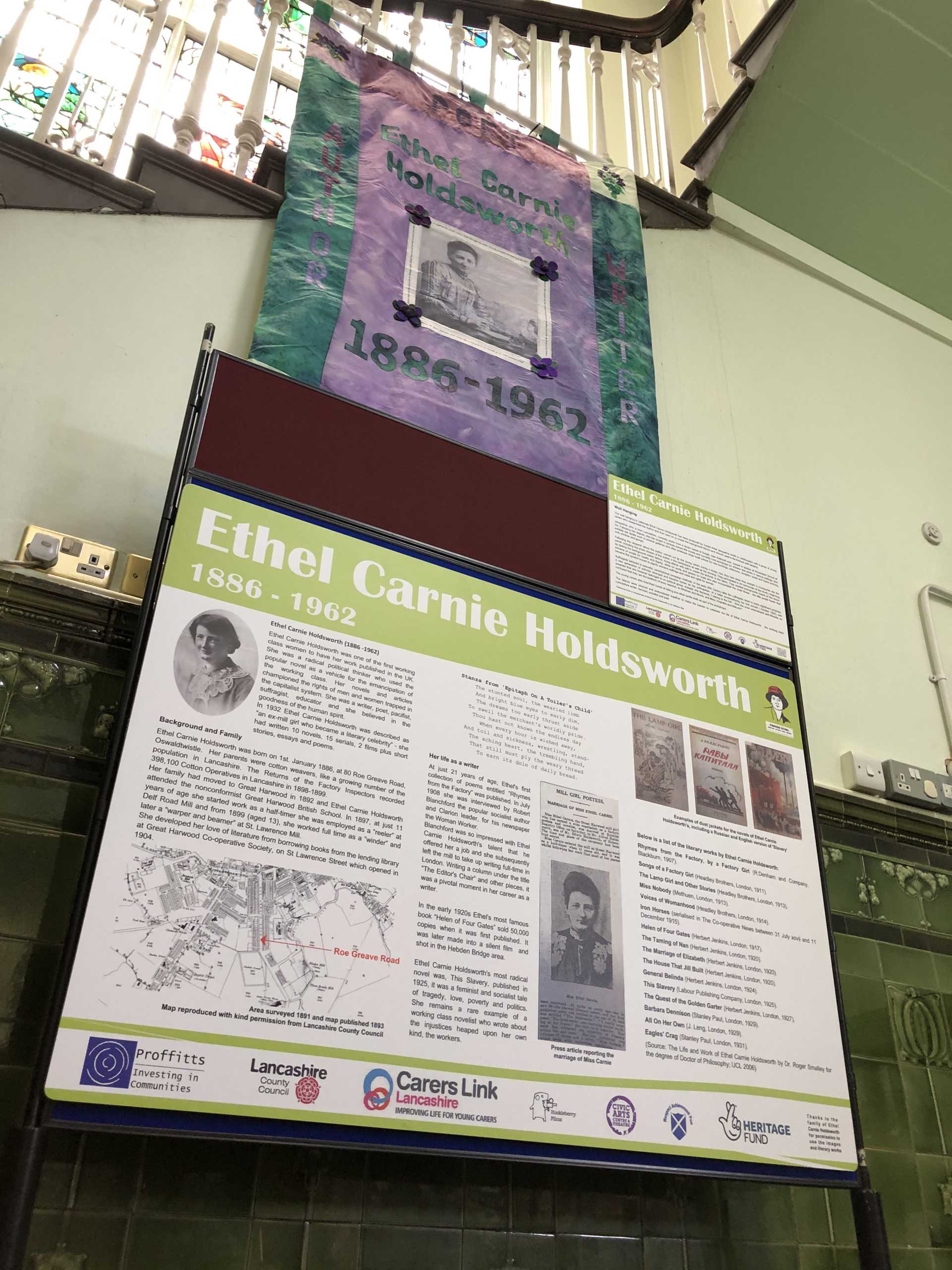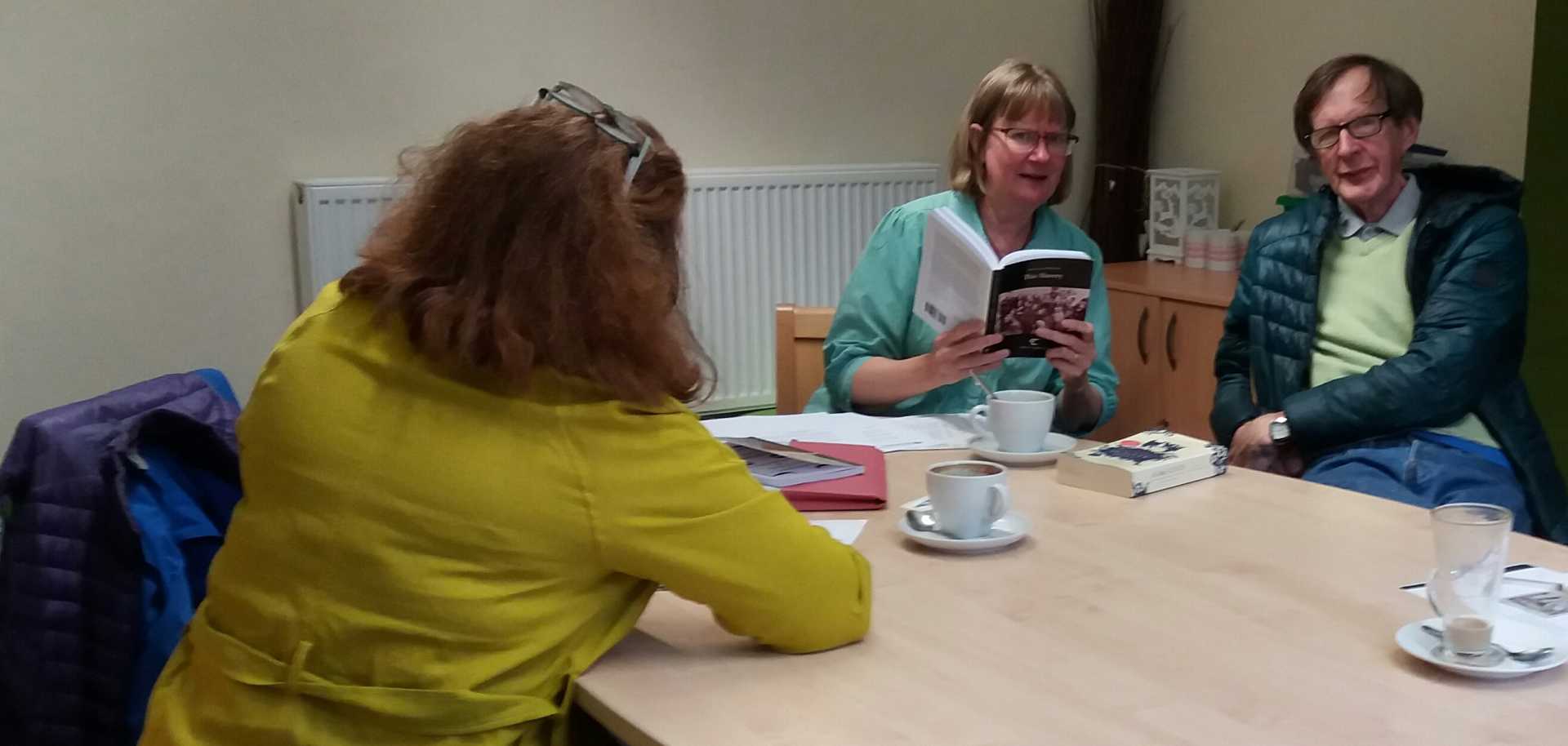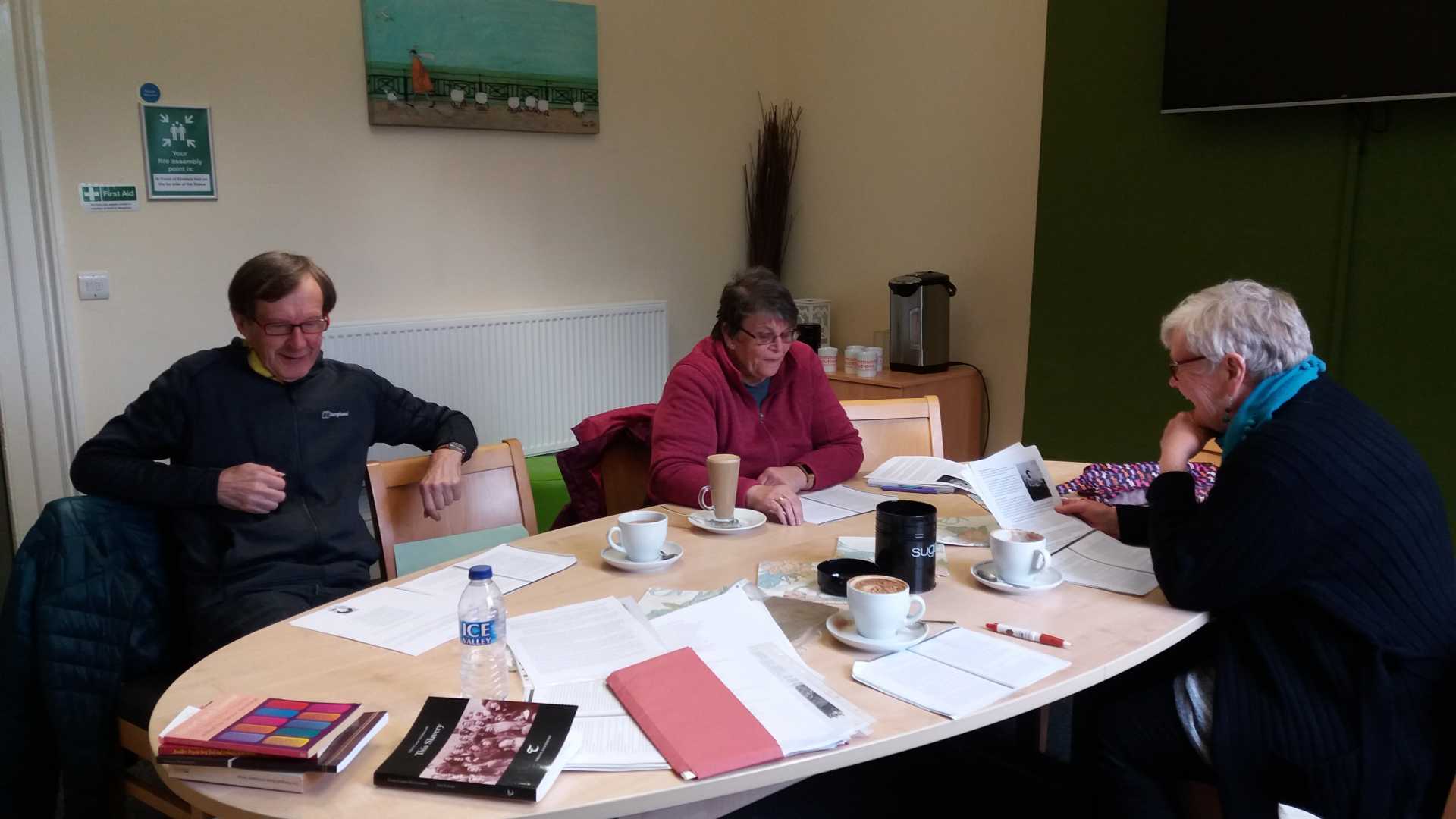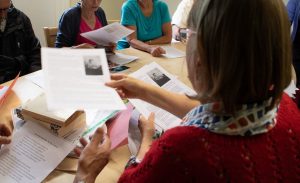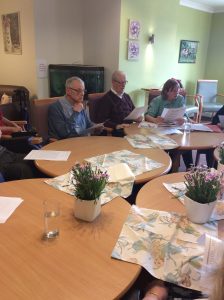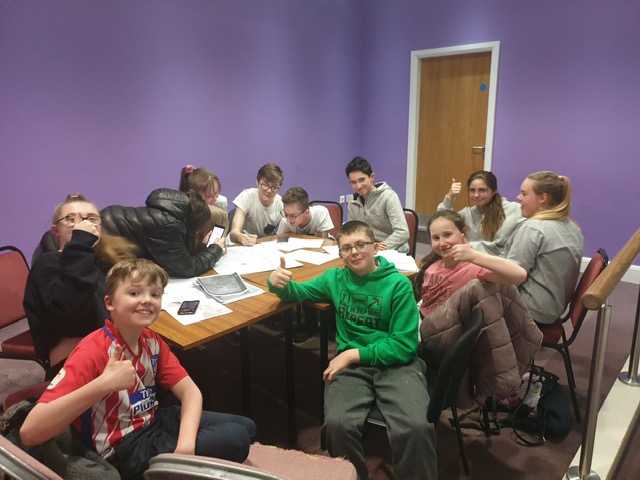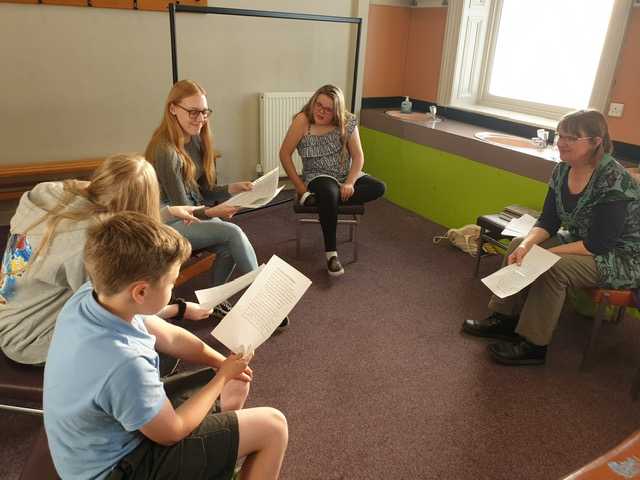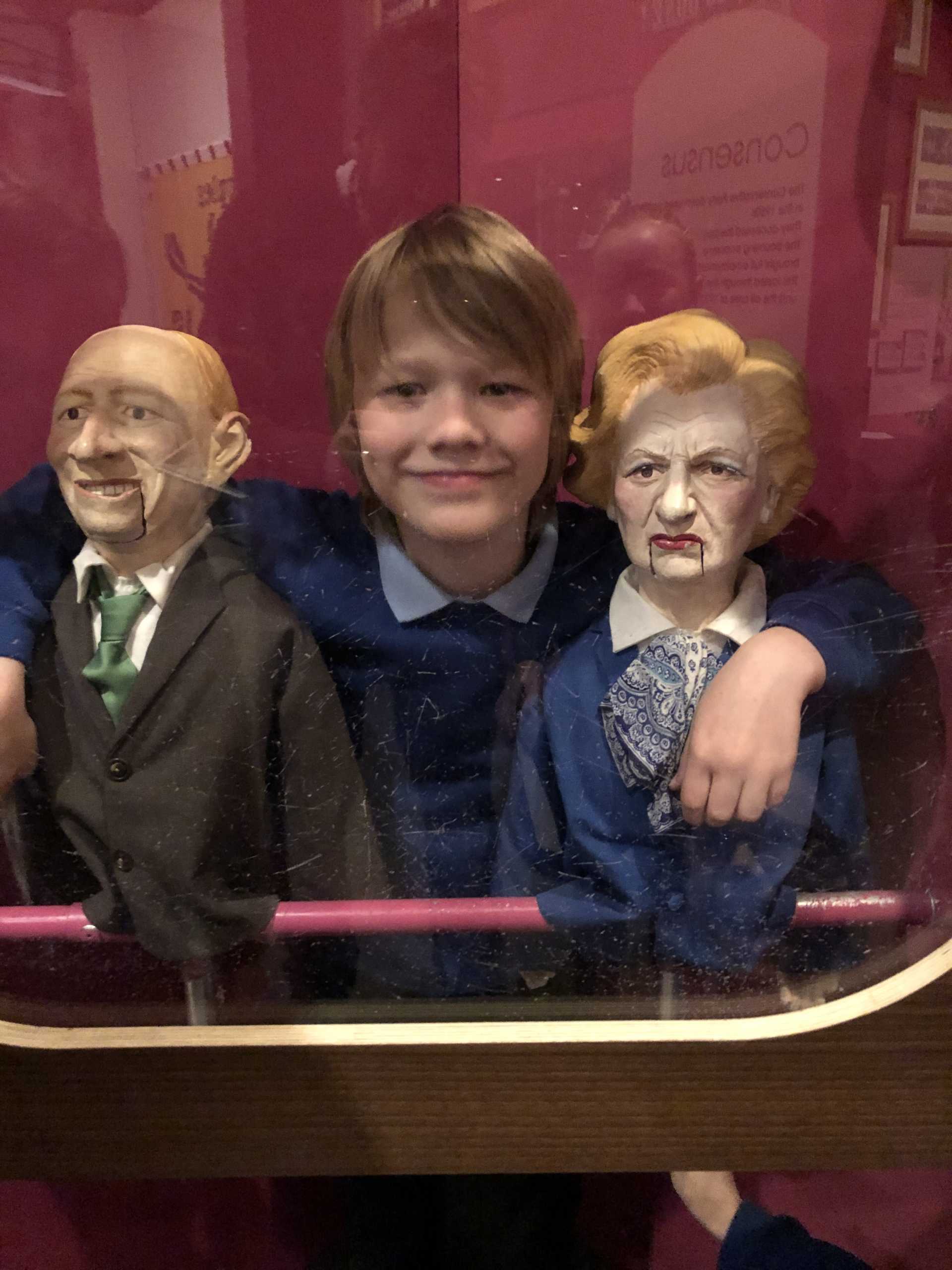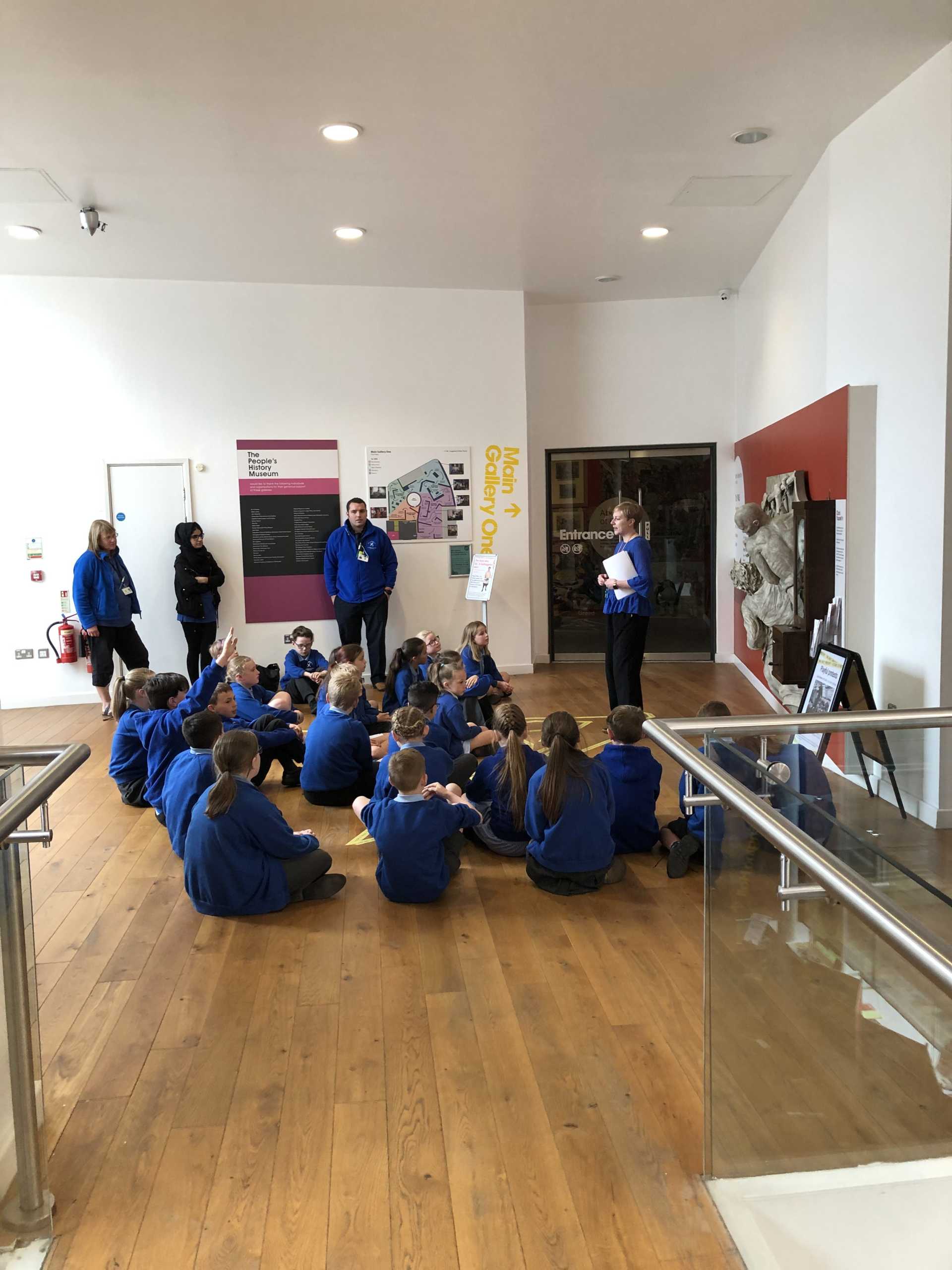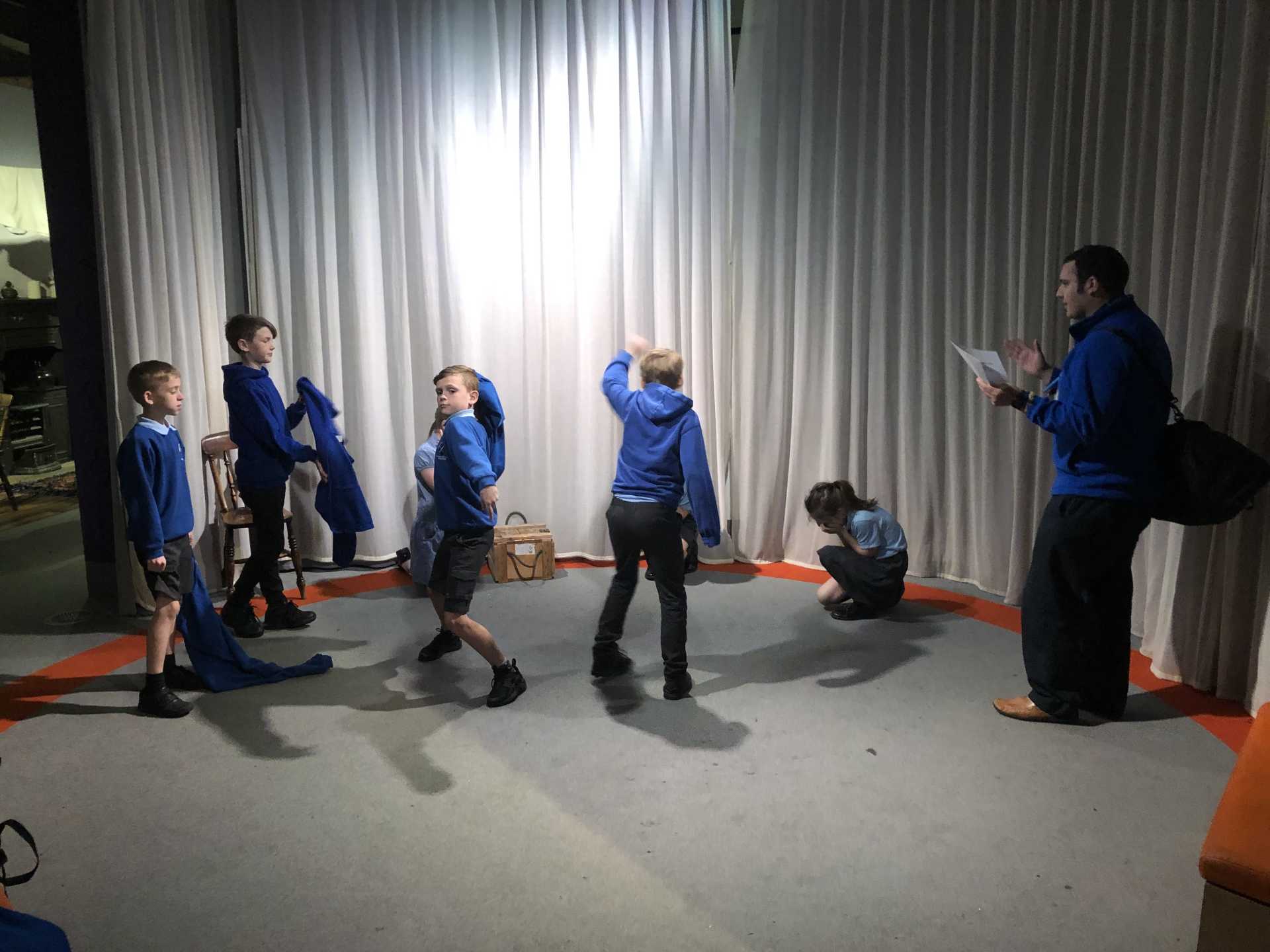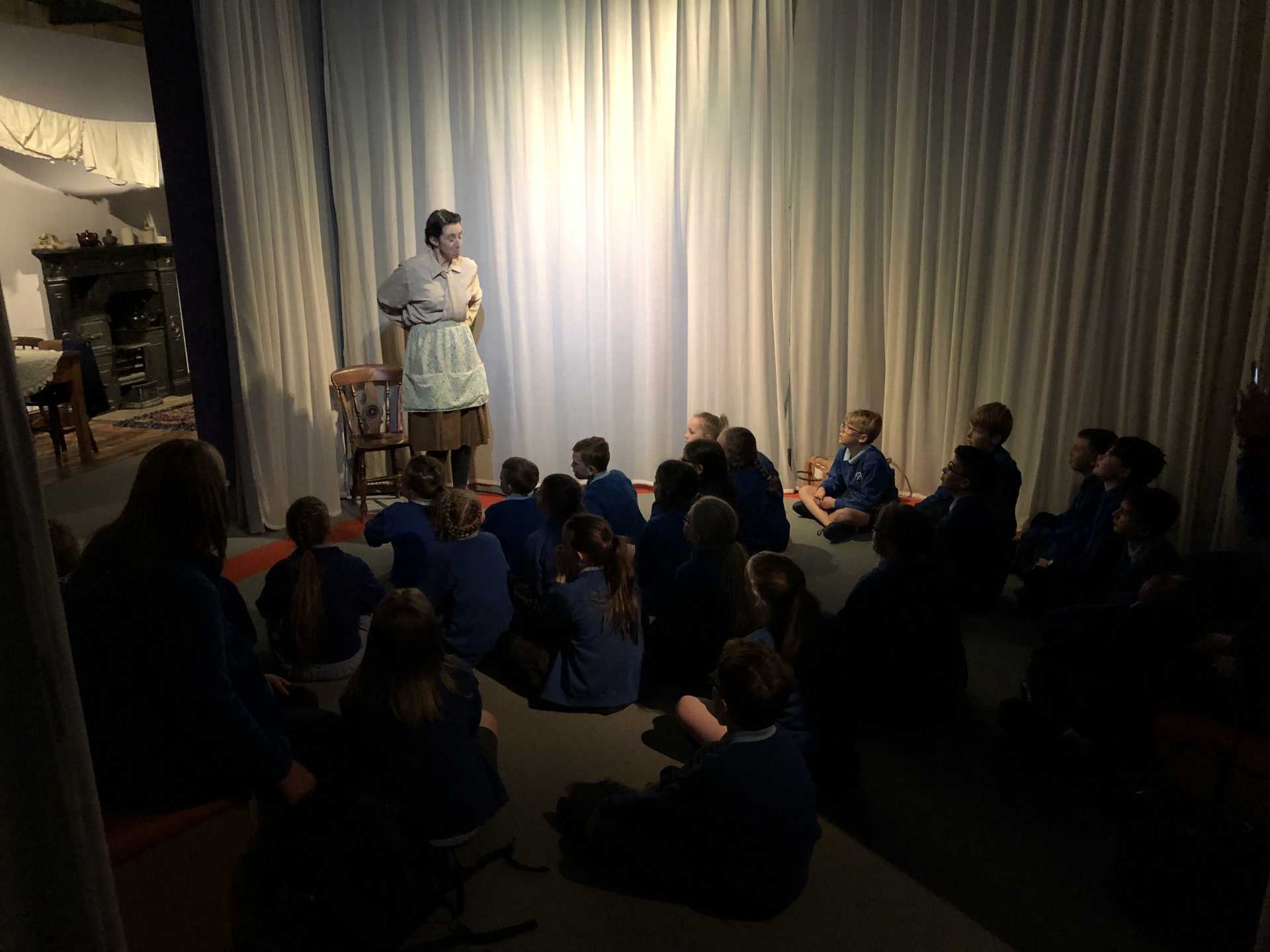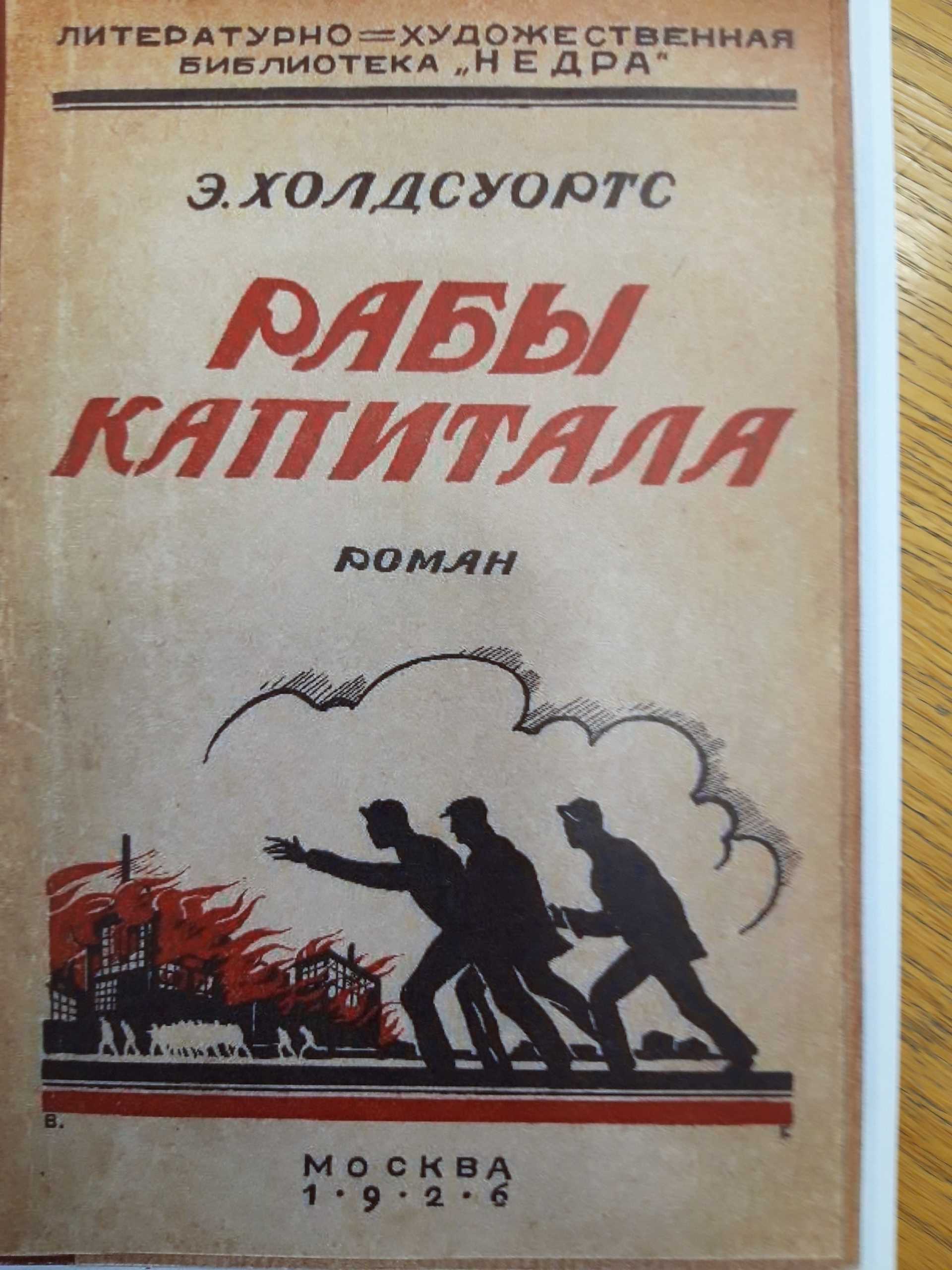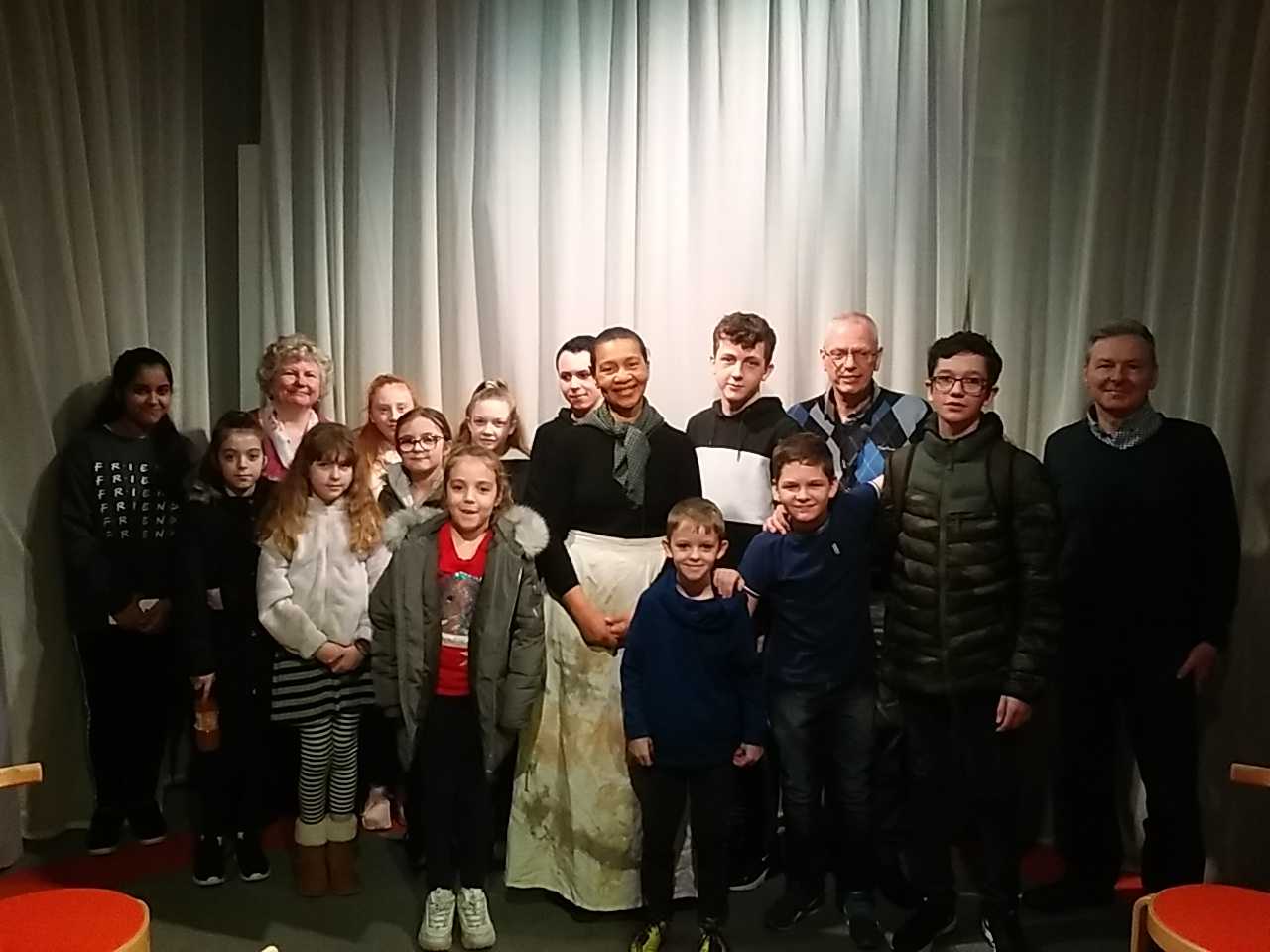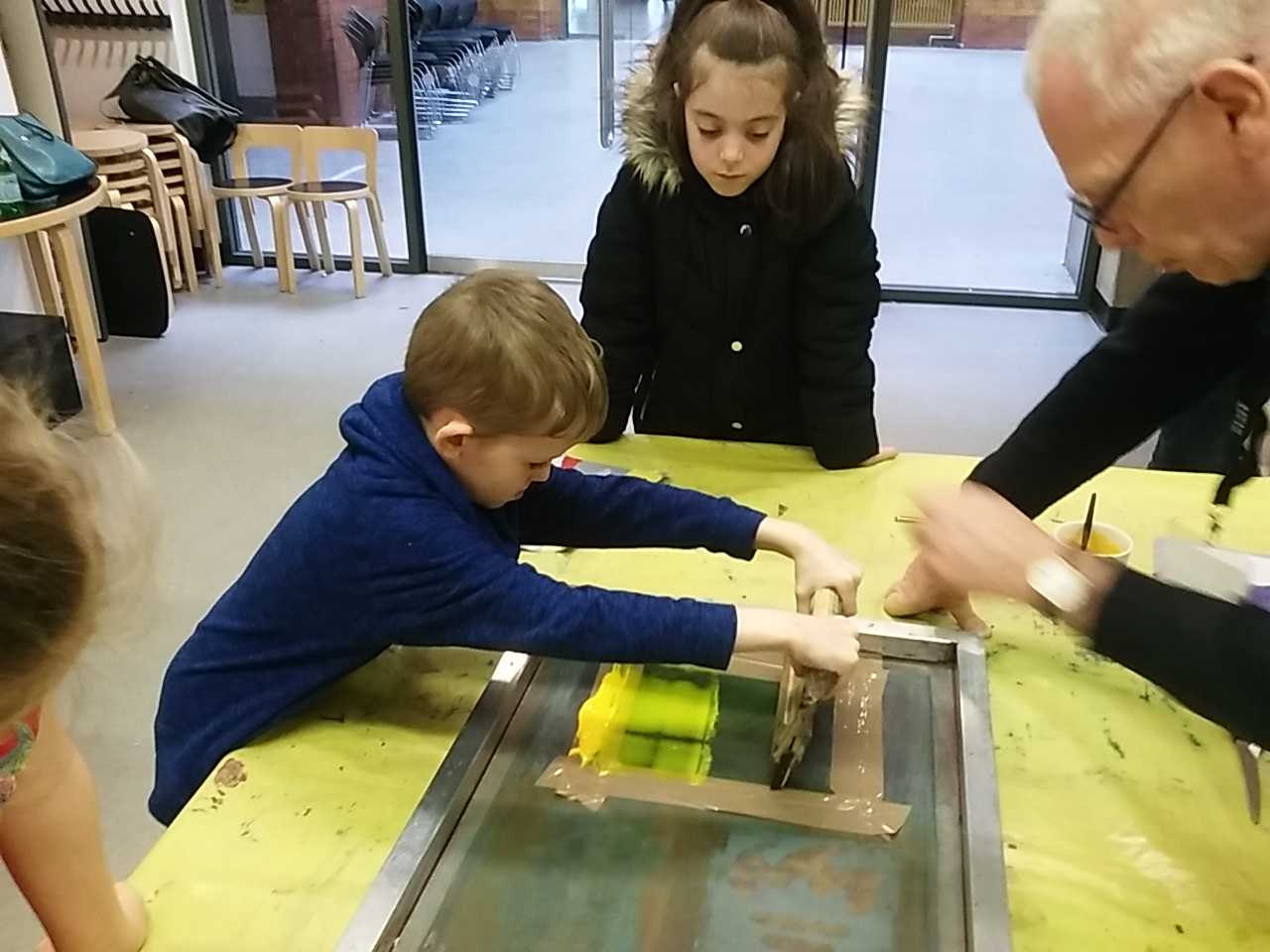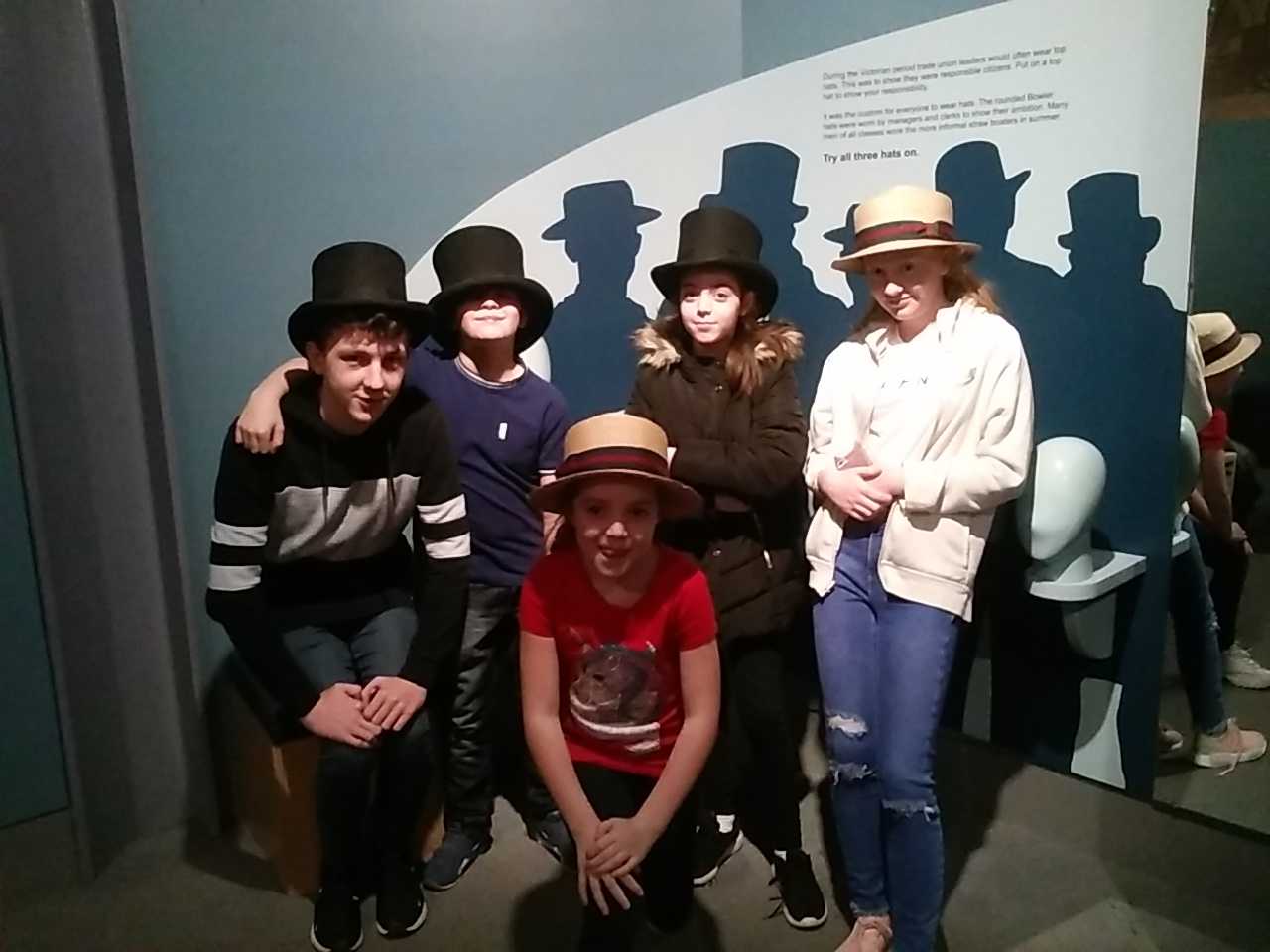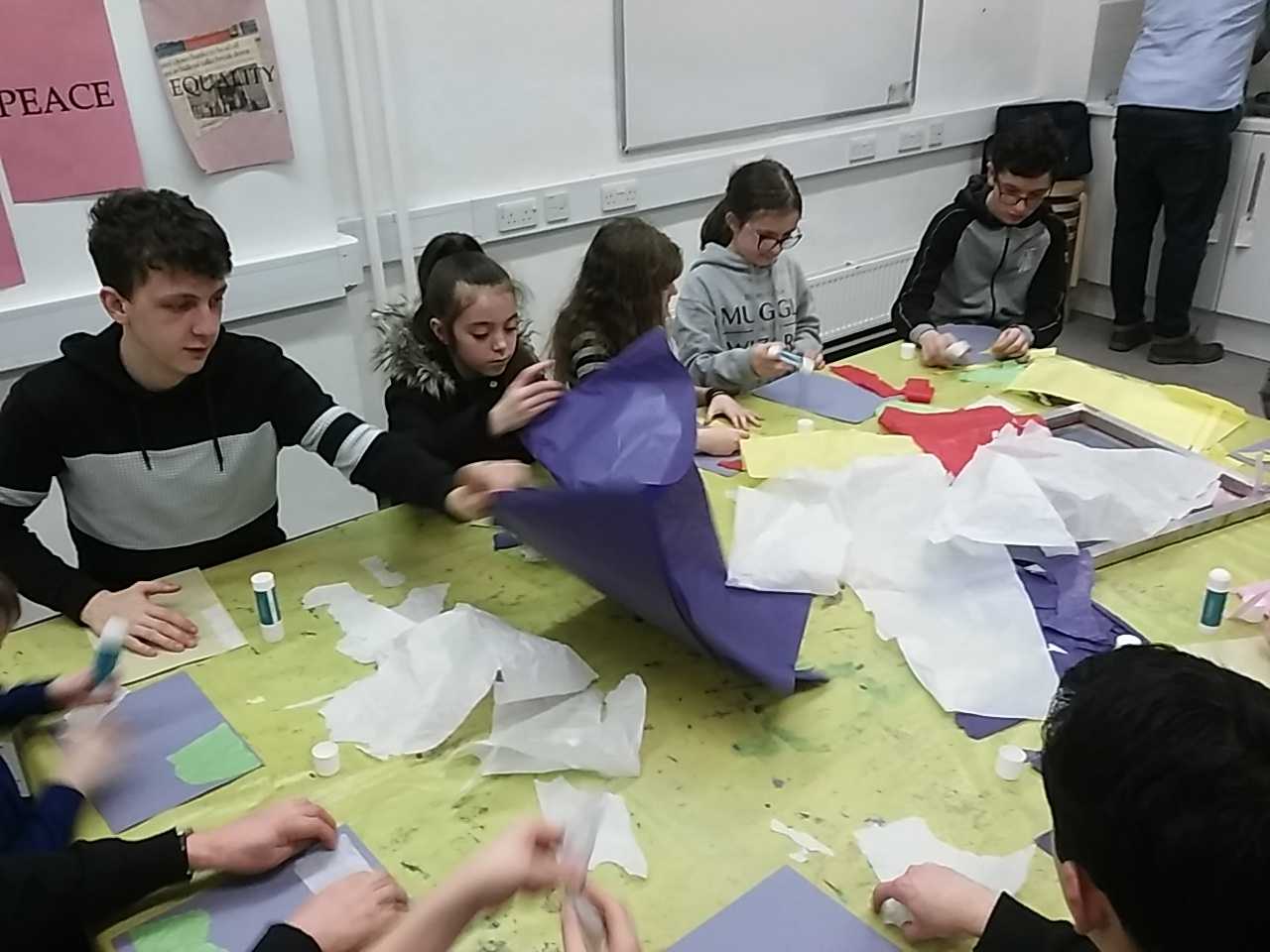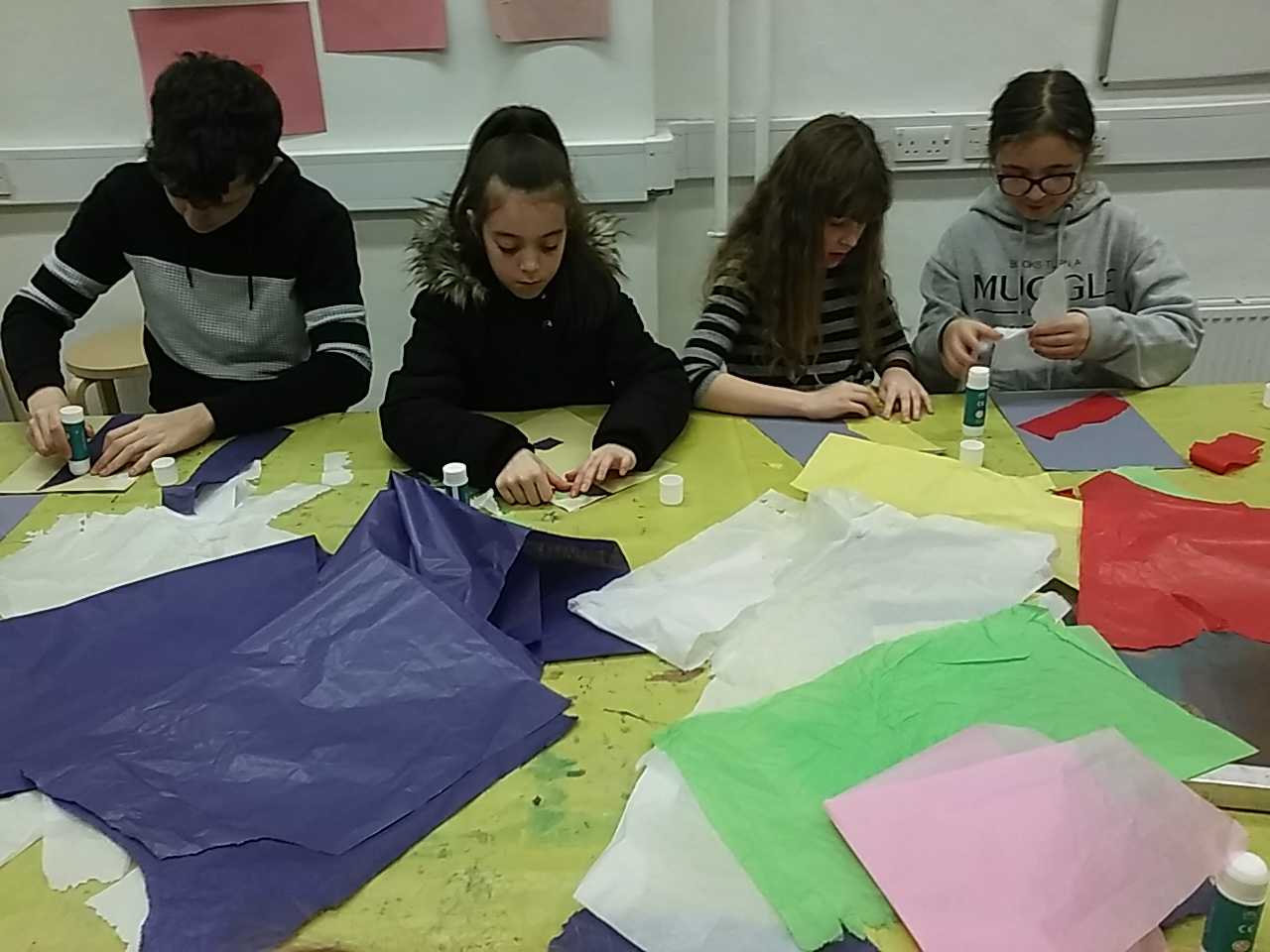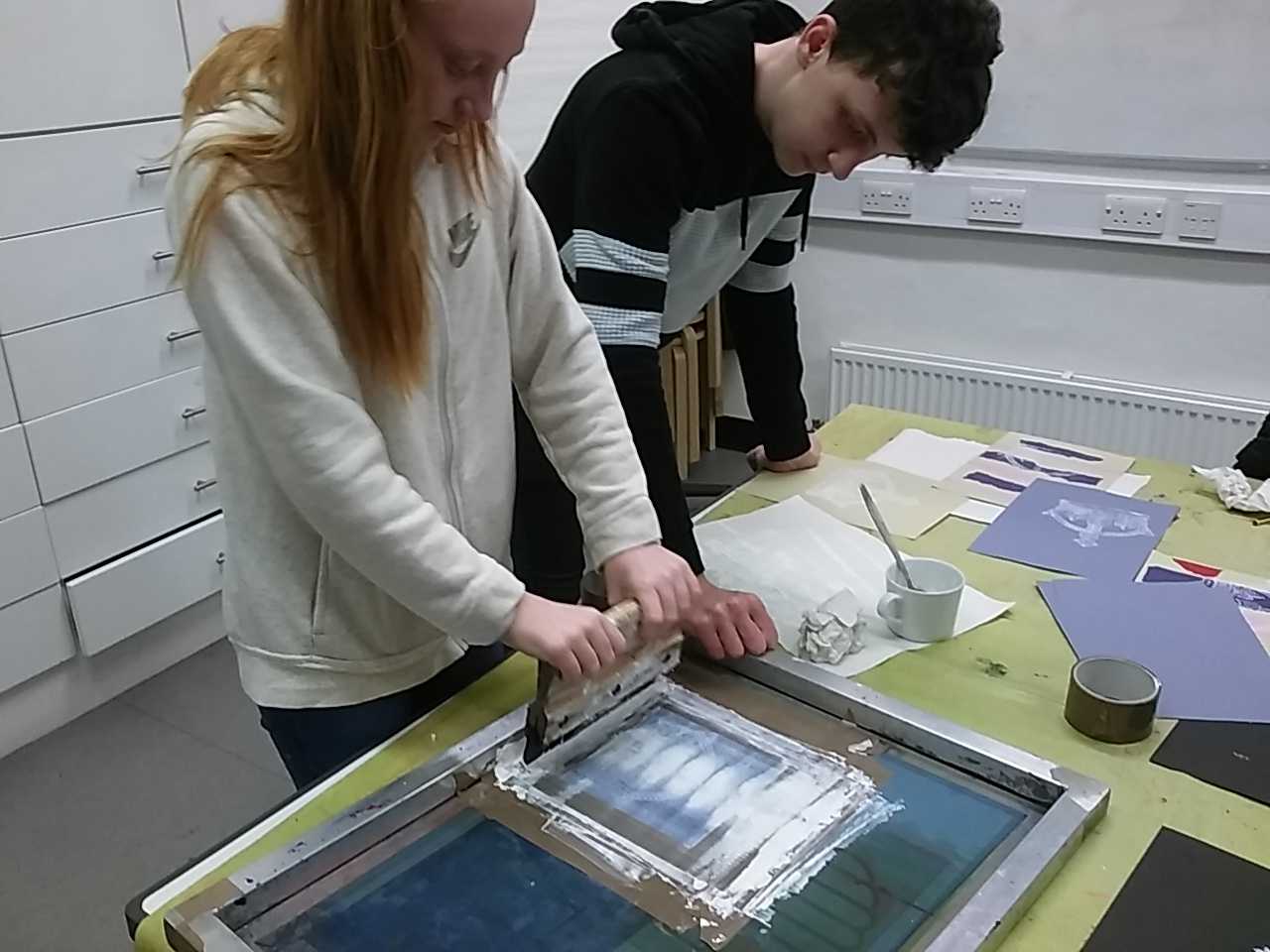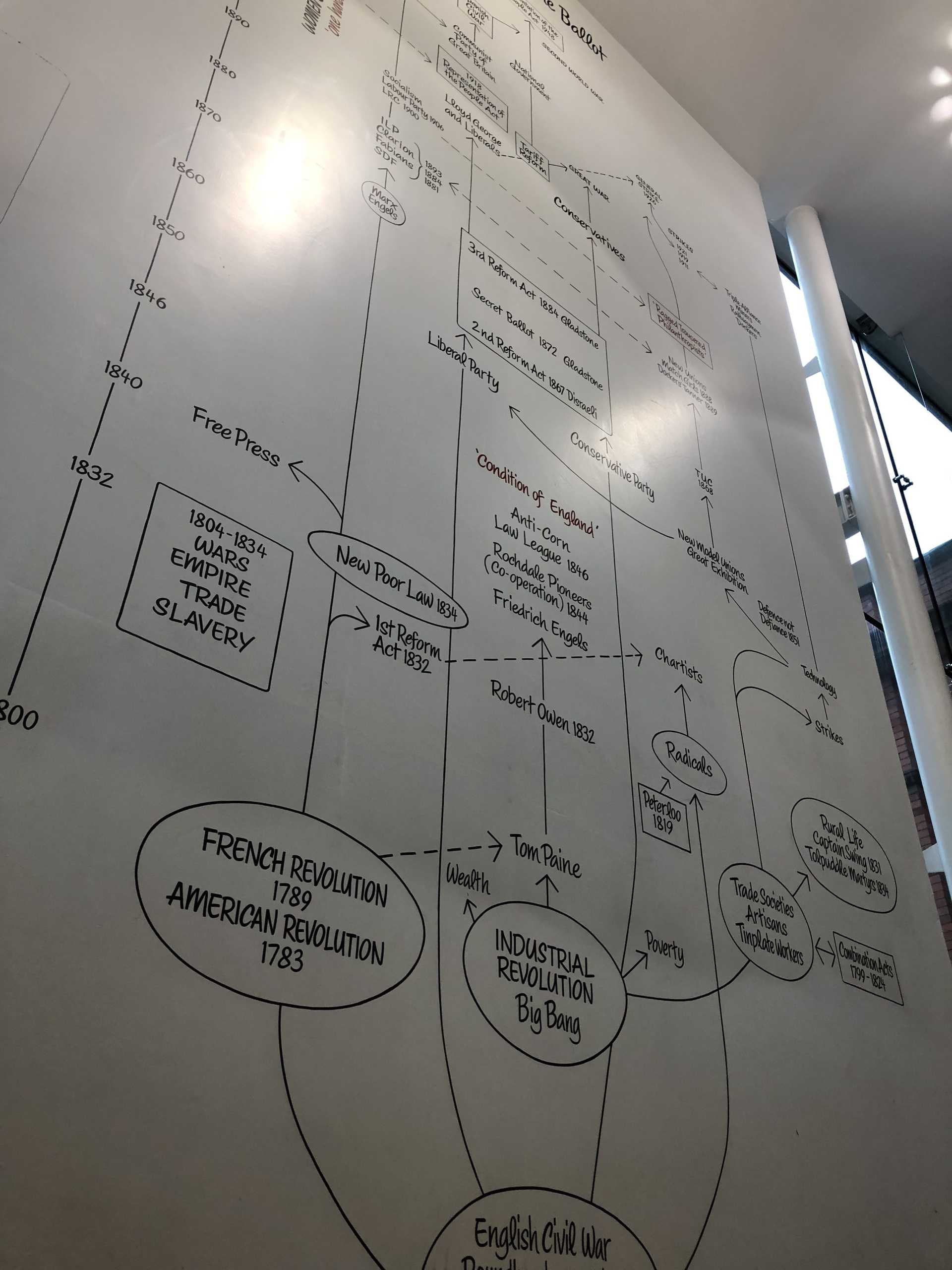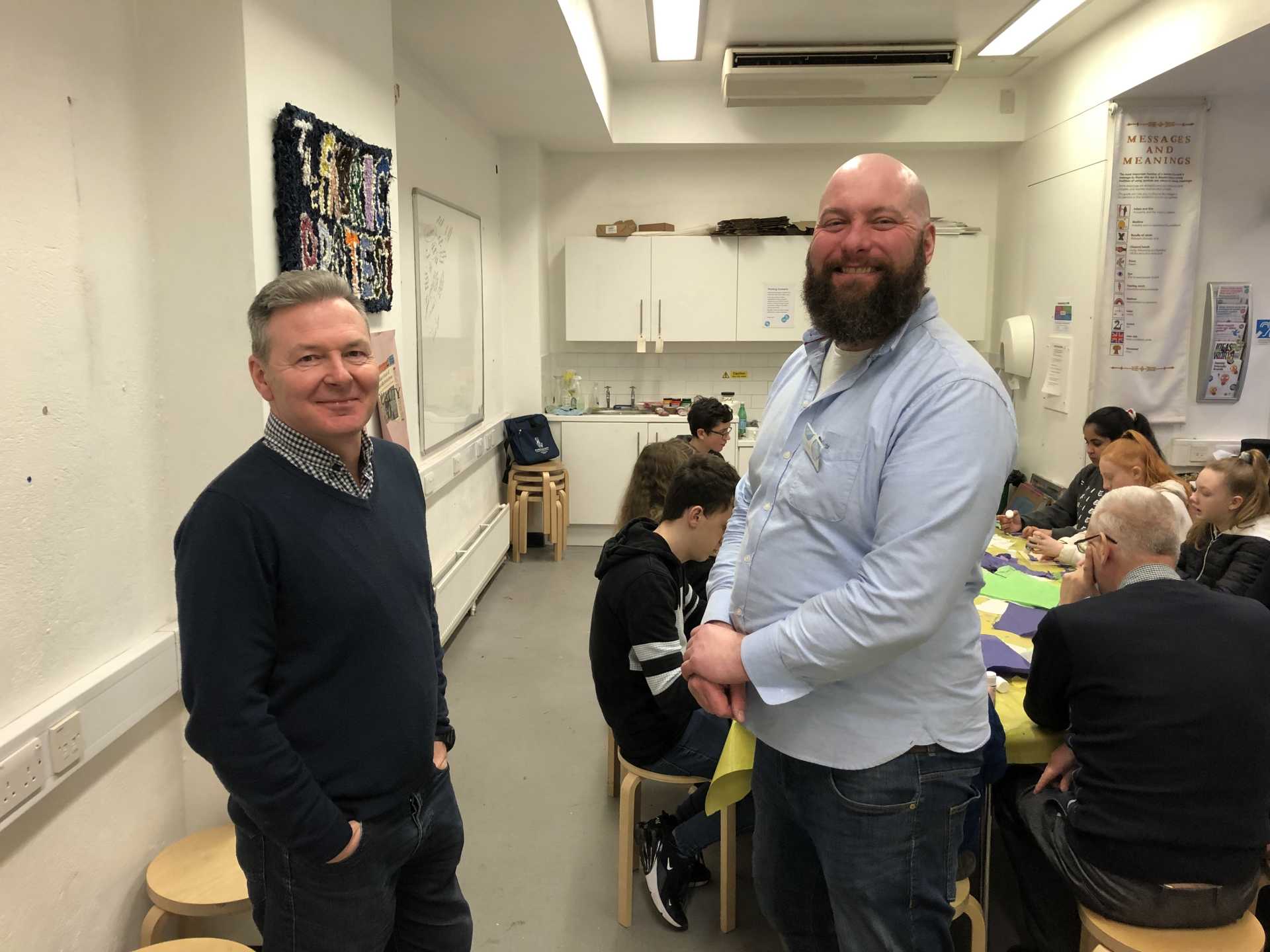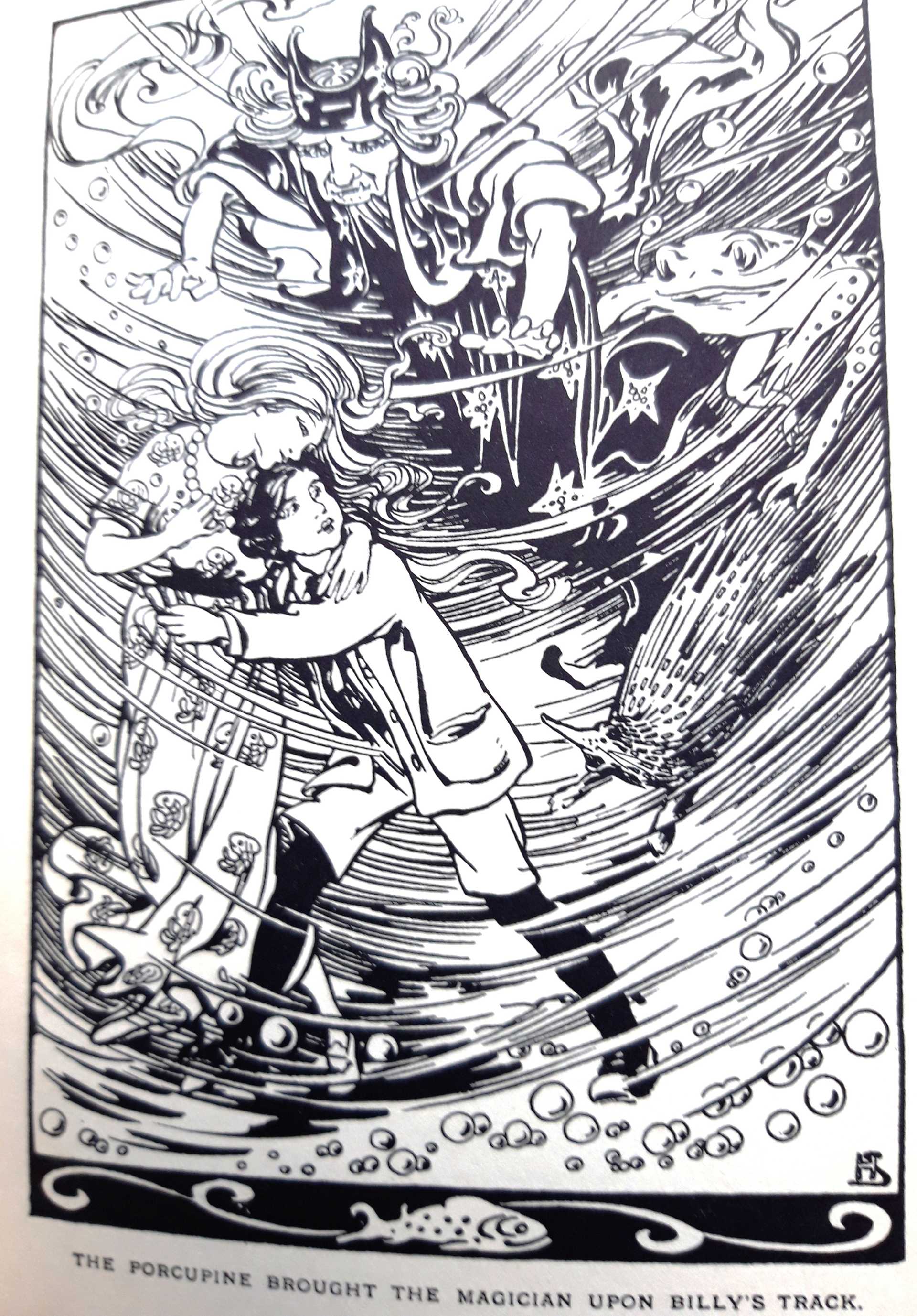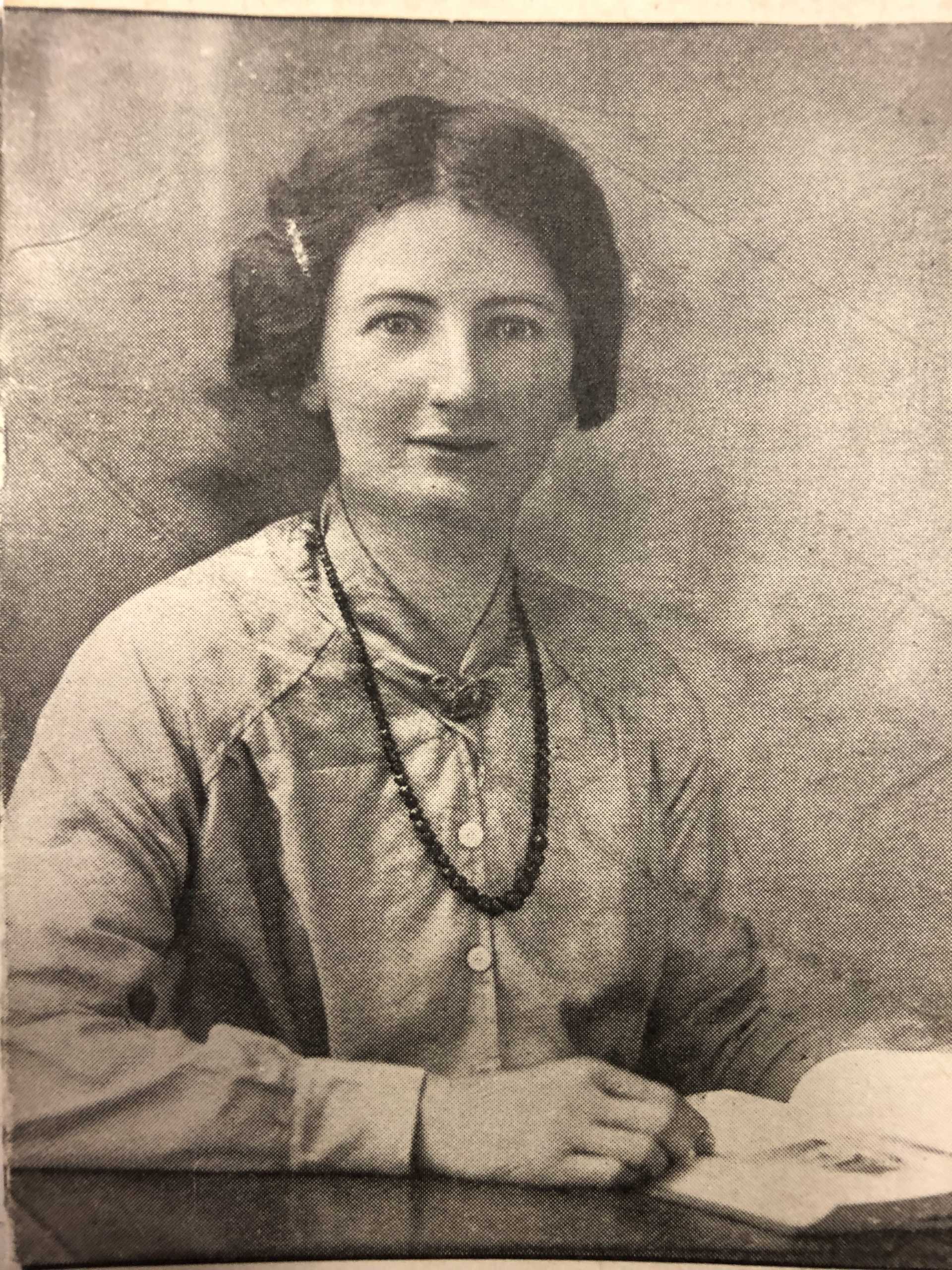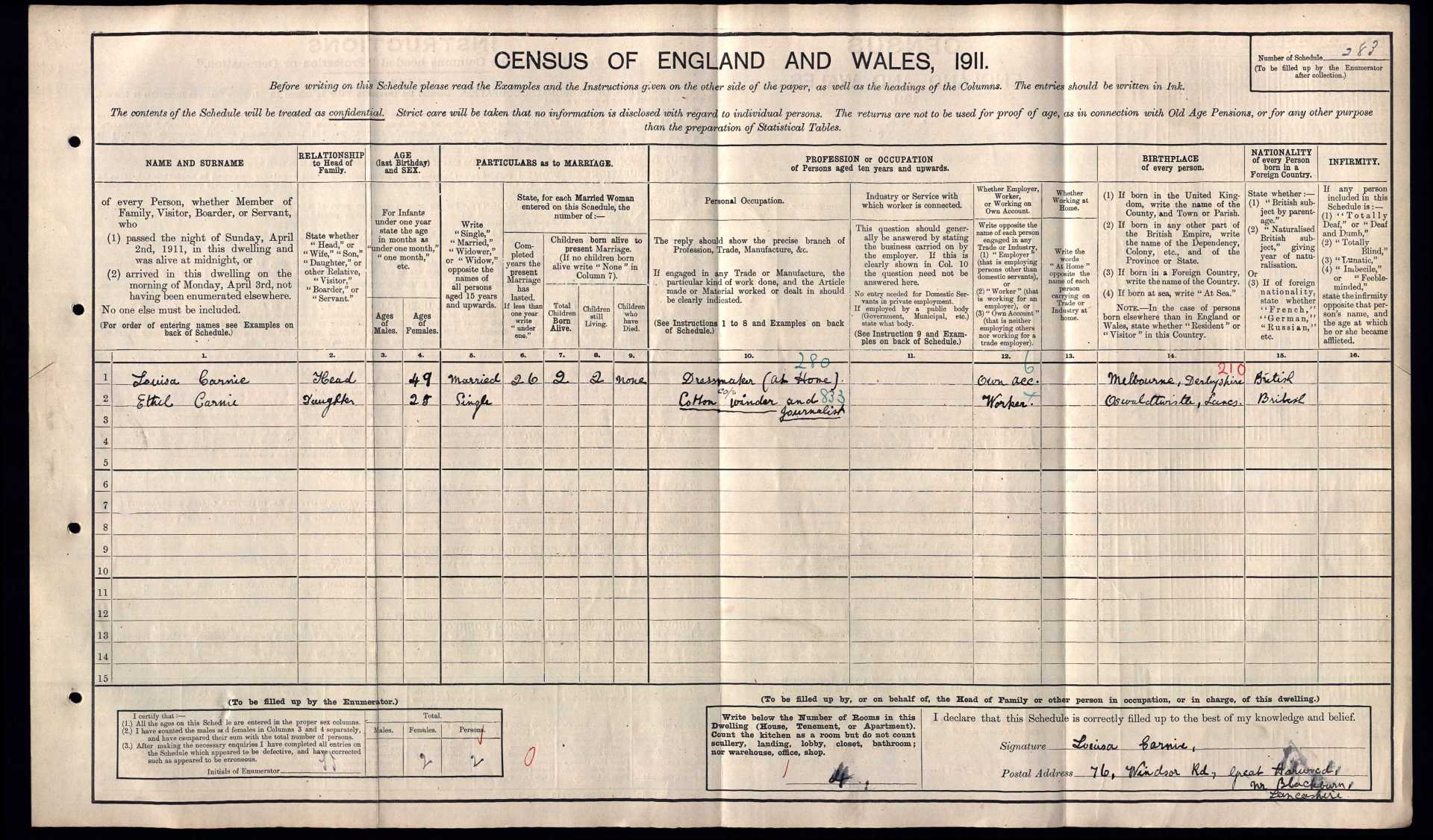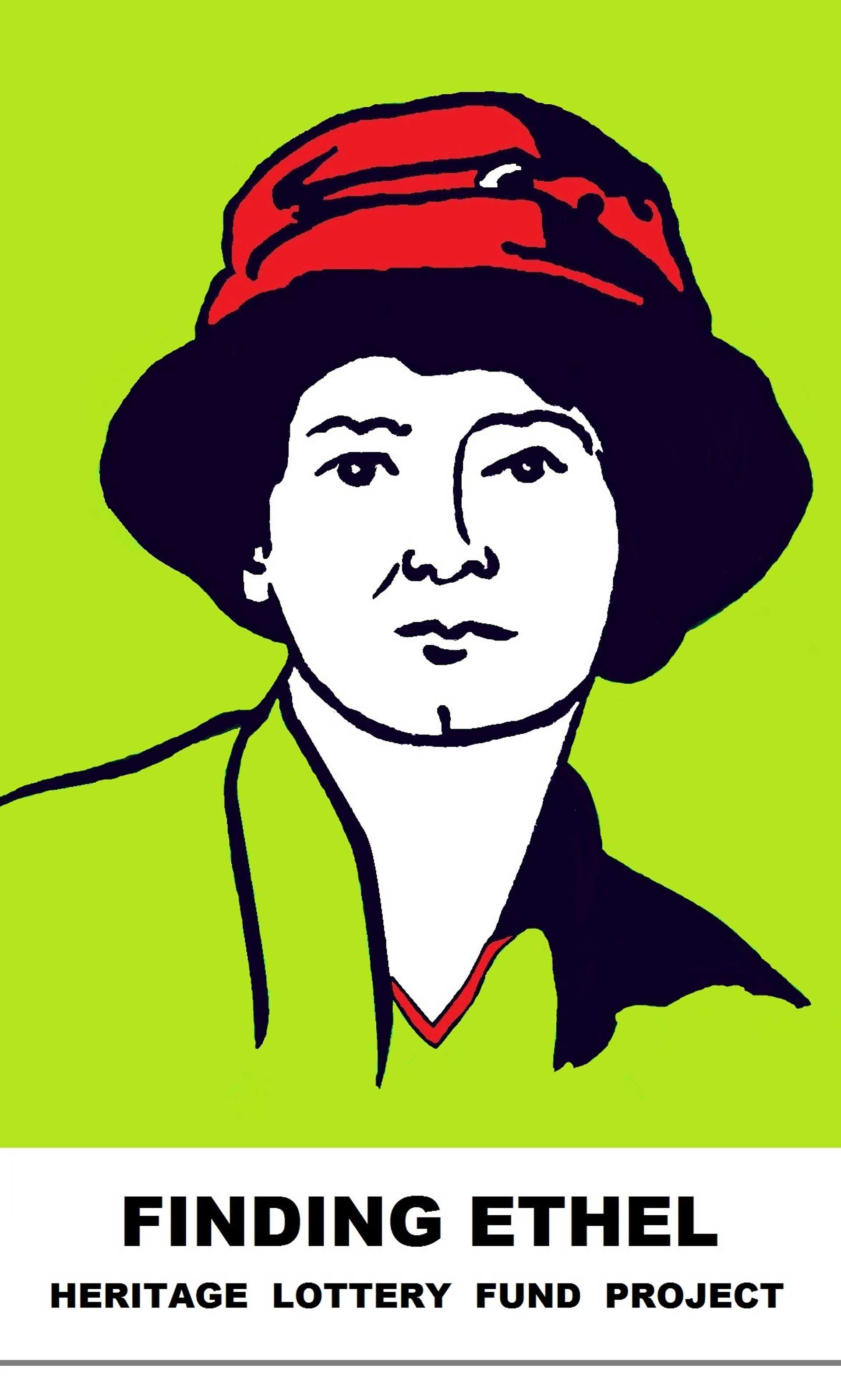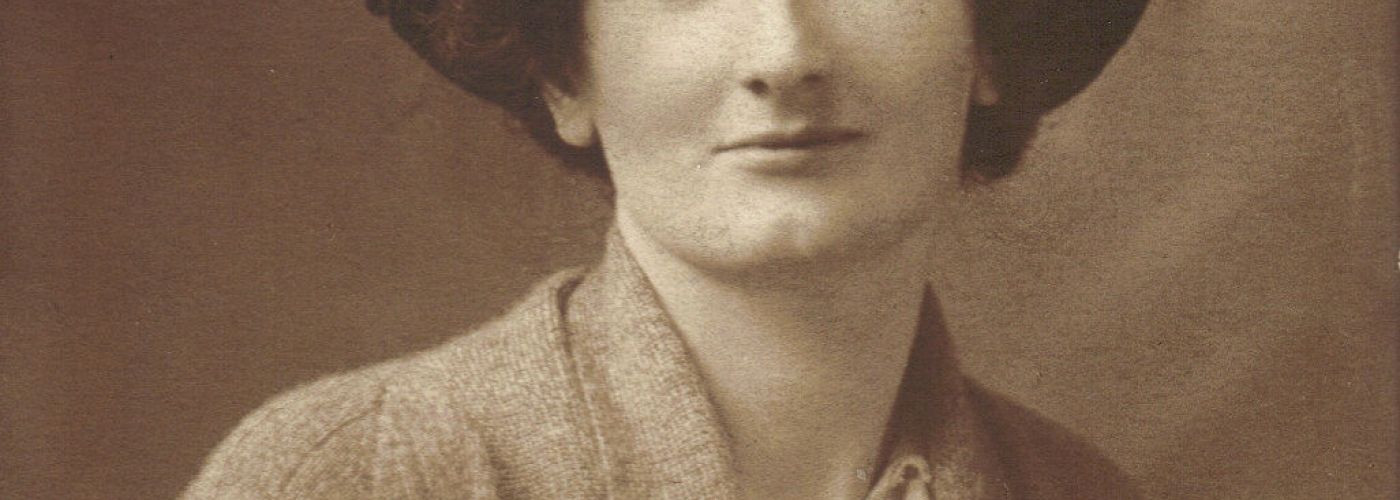
Finding Ethel – Archivists of a Lost Historical Figure, Oswaldtwistle
07.06.2022
More great news for supporters of the Ethel Carnie Holdsworth project! Huckleberry Films, who created a short film about Ethel as part of the project, have been approached by the North West Film Archives to ask if they can place a copy of the film in their archives.
The Ethel film will be accompanied by another piece of work, inspired by the Ethel film, about Rachel Kay-Shuttleworth – another hugely inspirational local. Rachel taught crafts and sewing to help improve the health, social and economic prospects for those in the community most in need. She was a maker, teacher, philanthropist and social activist and she also played a key role in the development of the Girl Guides movement in Lancashire, being involved for over 30 years.
The film was commissioned by Community Rail Lancashire and made with the help of young people from year 6 at Padiham Green C of E Primary School. The class took inspiration from the amazing collection at Gawthorpe Textiles Collection that Rachel established, on a trip to National Trust Gawthorpe Hall facilitated by Lancashire County Council’s ‘Heritage Learning Lancashire’ team. Artist Cath Ford worked with the class over several sessions in school, to develop artwork for the film as well helping each child gain confidence in their own creativity. The animation includes archive photos, and footage courtesy of North West Film Archive. The film was premiered at the end of May at Padiham Green, as part of #CommunityRailWeek.
To have both films in the NWFA is another lovely part of the Ethel project legacy and we’re thrilled that the Huckleberry Films team, and all of their partners, have been recognised for their fantastic work!
You can watch the films here – we hope you enjoy them as much as we did 🙂
0202.2021
Just spotted this and wanted to share. The trailer is fantastic – we can’t wait to tune in. Keep your eye on the Lancashire Libraries facebook or twitter pages for more news!
Lancashire Libraries: We’re so excited to bring to you the trailer for our upcoming special Ethel Carnie podcasts, part of the BBC Novels That Shaped the World project made in conjunction with Mid Pennine Arts #MyBookLife Arts Council England BBC Arts
https://www.facebook.com/lancslibraries/videos/450197916340169
28.02.2020
Although this project has ended, we’re still coming across brilliant new information about Ethel that we haven’t seen before. Click below to take a look at an article in The Suffragette (1913) ‘WOMAN – A Study by One’:
https://digital.library.lse.ac.uk/objects/lse:kok595fuh/read/single#page/6/mode/1up
10.02.2020
Just received a great picture and update from the Lancashire Young Carers group who participated in one of the People’s History Museum trips last year. The group worked with Lancashire textile artist Jacqueline Smith to create a fantastic wall hanging celebrating Ethel and her achievements. It’s brilliant to get their comments to add to the feedback we’ve had from the other events and workshops – thanks to all those involved.
The project was interesting from start to finish. The young carers were able to Visit the Peoples Museum in Manchester to look at Banners and experience the times that Ethel Carnie Holdsworth lived in as well as taking part in a printing workshop.
We had visits to the local library to research the background of Ethels life and study maps of where she lived. The young cares particularly enjoyed reading some of Ethel’s poetry.
They then undertook artwork with local artist Jackie Smith over at her studio near Skipton she helped them produce a fantastic Banner celebrating Ethel Carnie Holdsworth which will be hung in Carers Link Lancashire Hub for the local community to enjoy.
The young carers said that taking part in the project helped them learn new skills and information about the local poet and author but it also give them a much needed break from their caring role.
“I had not heard about Ethel before but found her life interesting and I enjoyed working on the project” Jordan 16
“I enjoyed working on the banner it looks fantastic and it was good to be part of it” Rebecca 12
“I live in Oswaldtwistle and found the project really good, I enjoyed all the research and looking at the maps of where Ethel lived as it was near to my house. I also liked how we incorporated what we learnt into the banner” Malachy 14
“We used different techniques to make the banner and I learnt so much I am very proud of what we achieved” Rukhsar 13
“It was really good learning about Ethel and how she tried to make a difference through her writing. I liked creating the artwork and think the banner is great” Cole 17
20.01.2020
This happened when Ethel became one of the key characters in the Mid Pennine Arts “Pendle Radicals” project (as she was very politically active when she lived in Barrowford and Barnoldswick). Staff from Spot On / Culturapedia (a rural & library touring network funded by the Arts Council and Lancashire County Council along with local authorities) thought the Ethel work also tied in to a commission that they are just launching for Great Harwood Library. The cross over is about the number of strong women in Great Harwood and here is that commission if any one is interested https://culturapedia.co/adventures/spot-on-library-touring-commission/ .
13.01.2020
As the project ended, one of the final jobs was to get out and about and post the Finding Ethel calendar to people living in the area that Ethel grew up in. Every page contains fantastic images and information about Ethel, and we hope that everyone enjoys learning more about her over the coming months.
We’ve also been reading the feedback forms that people involved in the project have shared with us – and there’s a summary of that information below.
Thanks again to everyone involved – we’ve loved working with you!
27.11.2019
A Power point presentation has been designed to accompany the Ethel Carnie Holdsworth animation ‘Finding Ethel,’ which was produced by Huckleberry Films and includes artwork created by young people from St Andrew’s Primary School working with artist Cath Ford. It has been put together as an information source for Primary School Teachers.
It contains a brief historical timeline of Ethel Carnie Holdsworth’s life and works. It also includes an explanation of the difference between the Suffragist movement and Suffragette movement. There are also web links to relevant historical sites.
The resource has been shared with schools across Oswaldtwistle, but if you would like a copy for your school please email Martin Proffitt [email protected]
25.11.2019
One of the highlights from a special evening…the Ethel Carnie Holdsworth animation from the brilliant team at Huckleberry Films . Please do take a few minutes to watch it when you can – we promise you’ll enjoy it.
It was a great night – thanks to everyone who came along!
21.11.2019
Just a quick reminder that tickets are still available for the ‘Finding Ethel’ project finale which is due to take place TOMORROW, Friday 22nd November at the Civic. We really hope that you can join us. It’s a FREE event and tickets are available by calling the Civic Arts Centre and Theatre, Oswaldtwistle on 01254 398319 or via ticketsource
We really hope to see you there – it’s going to be a brilliant evening!
19.11.2019
The amazing children in classes 6 and 6a from St. Andrew’s Primary School in Oswaldtwistle have been learning a song all about Ethel Carnie Holdsworth. A brilliant performance and so fantastic to see young people recognising the importance of Ethel and her work locally!
https://www.facebook.com/watch/?v=438037020425725
28.10.2019
At Huckleberry Films recording is underway with the amazing Jules Gibb who will be the voice of Ethel in their film.
We’re so excited about this part of the project – can’t wait to see the end result!
15.10.2019
16.09.2019
Great to see local coverage in the Accrington Observer of the fantastic Ethel Performance Walk and Discovering Old Oswaldtwistle Finale event that took place on Friday 6th September. The work that the young people did on the interactive performance walk was amazing, and do watch out for the launch of the new website with details of walks and heritage trails as well as some great old photos of Oswaldtwistle.
Tickets are still available for the ‘Finding Ethel’ project finale which is due to take place on Friday 22nd November at the Civic. We really hope that you can join us. It’s a FREE event and tickets are available by calling the Civic Arts Centre and Theatre, Oswaldtwistle on 01254 398319 or via ticketsource
13.09.2019
Finding Ethel Celebration Evening – Friday 22nd November, 2019 @7.30pm
Please join us to celebrate the life of Ethel – mill girl turned writer, poet, suffragist and social reformer. At the event we will showcase the work that the project has done and there will be a theatre performance devised by young people, the premiere of an animated film about Ethel and dramatisations of Ethel’s poems in word and in song.
We really hope that you can join us for this fantastic evening. It’s a FREE event and tickets are available by calling the Civic Arts Centre and Theatre, Oswaldtwistle on 01254 398319 or via ticketsource
29.08.2019
Come along and join the Ethel Performance Walk and Discovering Old Oswaldtwistle Finale event on Friday 6th September at 6.30pm at Civic Arts Centre and Theatre, Oswaldtwistle.
The event is funded by the Heritage Lottery and managed by Proffitts CIC.
As you know, the young people of the “Finding Ethel Project” have been researching this amazing, lost local figure; Ethel Carnie Holdsworth, who was born here in Oswaldtwistle! Ethel was a writer, poet, suffragist, educator and was the first working class woman to publish novels in this country.
You can join them on an interactive performance walk performed and created by the young people. Listen as Ethel’s life is retold through actor led performances of her important moments, stories and poems at various stops. The hour long walk down Union Road in Oswaldtwistle will start from the Civic Arts Centre and Theatre and is fully accessible throughout. After the promenade performance, attend the Discovering Old Oswaldtwistle Finale to share further examples of her poems and stories and find out about exciting new heritage trails!
Here are some pictures of the young people rehearsing their pieces for the Ethel Walk – we do hope that you’ll come and see the final performance. The event will be FREE to attend and everyone is welcome.
For more information contact Gayle or Sophie at the Civic Arts Centre and Theatre on 01254 398319
30.06.2019
With thanks to pupils from St Andrews Primary School, Oswaldtwistle and children from Carers Link, Lancashire for all the research they have carried out – we have managed to pull together two items of interpretation which will inform people of the life and works of Ethel Carnie Holdsworth for years to come. Currently displayed at Accrington library, the interpretation will tour Hyndburn as we deliver the next phase of the project such as the performance of ‘This Slavery’ at Oswladtwisitle Civic Arts Centre & Theatre (date to be released soon).
17.06.2019
Just a reminder that Janet Swan is running reading groups for local people. They’ve been looking at Ethel and her work, and finding out more about the history of their area. So far, 10 reading groups have been completed with a further 6 or 7 planned. Take a look at the links below if you’d like to find out more:
https://www.facebook.com/search/top/?q=finding%20ethel%20springhill&epa=SEARCH_BOX
Ethel’s poems have now also been added to the Poetry Archive. The poems sound amazing – having been given voice by 2 local women – Liz Catlow and Jules Gibb. Do explore if you have time: https://www.poetryarchive.org/poet/ethel-carnie-holdsworth
13.06.2019
Last month the young people at the Civic Arts Centre and Theatre spent some time trying to find out as much as they can about Ethel Carnie Holdsworth. This has helped them to have a better understanding of her life, views and what influenced her work. During their sessions they have enjoyed reading her poetry out loud and have just started reading “This Slavery”. They have looked at the local moors/fields and landmarks that have influenced some of her poetry and tried to get an understanding of how it may have looked in Ethel’s era. This has given them a real insight into her feelings at the time and the reasons she felt so strongly about trying to make a positive change for a fairer society. The young people have researched local historical context, conditions and job roles in the mills and have learnt about the suffragist/suffragette movements. They have watched videos of how mill machinery was operated and what tasks Ethel would have carried out as a winder. They have researched job rolls for young children and the education system. They have also held debates about the roles of men and women during Ethel’s era and looked at how this affected people’s attitudes at the time. One of the young people performed as “Ethel” in “Discovering Old Oswaldtwistle” A promenade, interactive history walk and performance. During this show she shared with the audience a summary of her life, work and some famous quotes. The Young people were using this as a “hook” to get local people interested in their Ethel project and to make sure she is never forgotten. It was so amazing to see how many people wanted to find out more about Ethel after this. The group also enjoyed a visit from Janet Swan who lead a poetry reading session. This was a brilliant session and we loved talking about the meanings behind Ethels poetry in greater detail, the young people are very keen to use lots of her poetry in their final performance. They are currently putting their script ideas together and looking at what places we can visit to gain more background knowledge about Ethel’s time.
29.05.2019
Interesting article by Peter Magill, Special Correspondent at the Lancashire Telegraph!
https://www.lancashiretelegraph.co.uk/news/17667634.revival-of-mill-girls-poetry/
29.04.2019
Really fantastic day with the year 5 and 6 pupils from St Andrews school, Oswaldtwisitle on Friday. One group enjoyed a day out at the People’s History Museum and the other group went along to Queen Street Mill in Burnley. We found out a huge amount about the era that Ethel Carnie Houldsworth lived in and gained a really good understanding about how her views developed and the need for a fairer society. Thank you to all the staff at both museums for a brilliant experience!
08.04.2019
Finding Ethel / Reading Ethel Group – See Below for Details!
What is Finding Ethel / Reading Ethel?
“Finding Ethel” is a local project to celebrate the life of local author, poet and activist Ethel Carnie Holdsworth. Ethel who was self taught, went on to publish 10 novels – one of which was turned into a film. She believed that human beings are better when we are meshed together and work together. Perhaps she learned this from her time working in the cotton mills of Great Harwood?
The free reading groups in this project are different from most reading groups in that there is no homework! – no need to do any reading at home! Instead stories and poems are read aloud by the group leader within the session. The group often stops to discuss people’s questions, thoughts or responses to what has just been read. It is also ok to just sit back, listen and relax.
Who can join a Reading Ethel group?
The groups are for people of any age who want time and space to relax, talk about life and get into reading – all within in a small informal group setting.
Members of the group are not “taught” but “learn from each other” thus helping to build trust, friendship and confidence.
Where and when and how?
We will meet at Elmfield Hall, Gatty Park on Friday afternoons from 1.30 to 2.45 pm. The dates are as follows: 26 April, 10 May, 24 May, 7 June, 19 July and 2 August.
Find out more by contacting Janet Swan on 07777 686648 or Email: [email protected]
12.03.2019
On 06.03.2019 a Carers Link Group joined us for a trip to Accrington Reference Library for an archive research session with the team there. All participants commented that they had never visited an archive previously.
John Simpson, the local history facilitator, kindly helped us to locate the 1891, 1901 and 1911 census returns for Great Harwood. These were useful to identify where Ethel Carnie was living at the time and with whom.
We also found the first edition 1893 Ordnance Survey map showing Roe Greave Road in Oswaldtwistle, where Ethel Carnie was born in 1886.
In the immediate vicinity to Roe Greave Road, we noted four cotton mills, one colliery and two chemical works. Ethel’s formative years really were in the shadows of the cotton mills. These scenes would later form the inspiration for her novels and poetry.
The group also searched the postcard section and found a post card of a cooperative march in Oswaldtwistle at the turn of the century. We also found a letter written by Ethel to a Mr. Wallas reprimanding him for his condescending manner towards the ‘working class’.
Another very interesting find was the reproduction of a 1926 Russian edition of ‘This Slavery,’ using soviet style artwork typical of the time:
Carole Moulton the Youth Carers Development Worker at Carers Link Lancashire collated the ‘Young Carers’, findings from the archive material and their responses towards Ethel Carnie’s poetic and prose output. The library had a first edition of ‘Rhymes from the Factory’.
All participants chose their own favourite poem from the collection.
One person commented how ‘powerful’ her poems were and ‘loved her strong metaphors.’
The group now intend to create a banner which will celebrate the life and work of Ethel Carnie Holdsworth.
Thanks to everyone involved – it was a great session!
03.03.2019
Discovering Old Oswaldtwistle- We need your Ossy stories!
Join us this coming Sunday 3rd March for an exciting Sunday afternoon walk and story sharing session, celebrating people’s memories of Oswaldtwistle. Listen as local history is re-told on an interactive walk through Oswaldtwistle and share your own personal stories along the way.
The interactive walk will start at 2pm from Hippings Vale community Centre on Harvey Street Oswaldtwistle. The walk has access for all throughout and is wheelchair/ pram friendly. After the walk join us for soup and warm drinks back at Hipping Vale and listen to old Lancashire songs performed live.
A group of young people will also be joining us gathering research for a local history projects. They would love to chat to anyone who would like to share their own stories and experiences of living in Oswaldtwistle as we go on the walk. This is the start of a number of exciting history events funded by Heritage Lottery created by the Civic arts Centre and Theatre.
This event will be FREE to attend- Everyone welcome. For more information contact Gayle or Sophie at the Civic Arts Centre and Theatre.
20.02.2019
We all had a fantastic day out at the People’s History Museum today – all the children and young people from Carers Link were a joy.
The People’s History Museum is the national museum of democracy, telling the story of its development in Britain. The museum consists of two main galleries and a conservation department.
After we signed in the visitor’s book, we were then guided through the modern extension by an education coordinator to the activity room. We then participated in a Living History workshop based on the London matchgirls’ strike of 1888 at the Bryant and May Factory in Bow. We were each given a specific role within the match factory. The horrific conditions were explained, for example the severe occupational diseases of working with allotropes of white phosphorus, such a ‘phossy jaw’ which destroys the bones of the jaw. We also learnt about the harsh penalties workers received for minor transgressions.
The first living history workshop we attended was based on the story of a young girl working in a Victorian match making factory. We met an incarnation of Maggie McCallow, a Victorian match girl involved in the match factory strike of 1888. Through the performance we found out about her campaign for better rights for workers. This was part of our contextual exploration of industrial life for working class people. This would set the scene for our study of Ethel Carnie and her life as a part time winder in the cotton industry from the age of eleven.
Gallery one illustrates the Industrial revolution in Manchester and how Manchester became the world’s first industrial city. It charts how workers endured appalling living conditions and their struggle for representation and reform of the political system. Here a section displayed the oldest trade union banner in the world from 1821 made by the Liverpool Tinplate Workers.
At Gallery Two a guide explained the story of the Peterloo Massacre of 1819 and showed us items made to commemorate the event. We also saw an impressive display of political banners. From gallery two one can see through a viewing area into the conservation department which specialises in the care and treatment of textiles. Here our guide showed us, through a microscope, some examples of insects which can attack the textiles.
Following our lunch we participated in a workshop called ‘Print Power’. First we looked at the collection of banners and discussed the meanings of their signs and symbols. We then experimented with screen printing and mixed materials and created a piece of work to take home. We also saw many banners associated with the Suffragette movement. This also linked into Ethel Carnie’s campaigning work as a suffragist and spokesperson for women’s emancipation.
We intend to follow this visit up with a trip to the archives to research Ethel Carnie and record our findings in our own Banner that commemorates Ethel Carnie’s life and achievements as a working class author.
Thanks to all the PHM staff who worked with the groups today, and thanks to National Lottery Heritage Fund for their support.
11.02.2019
For those of you loving Ethel’s work as much as we are, here are a few of her poems to read and enjoy: A Lullaby, Epitaph on a Working Woman and Epitaph On A Toilers Child. All three, and more, can be found in the book ‘Voices of Womanhood’
A Lullaby
Without Apologies To Sir Walter Scott.
O Hush thee, my baby, thy sire was a slave,
Whom overwork thrust, in the dark early grave;
The gloomy, grey streets from this den which we see,
Are hungrily waiting, dear baby, for thee.
O hush thee, my baby.
O sleep whilst thou may, babe, by night and by day,
Thy pale mother rests not, but stitches away;
There’s no one to guard thee from hunger but she,
Her tears flowing silently all for thee.
O hush thee, my baby.
O hush thee, my baby, through days dark and wild
Stream sun-shafts of glory that can’t be defiled;
The marching of myriads is born to our ears,
And we will march with them, and sing through our tears.
O hush thee, my baby!
Epitaph on a Working Woman
Nothing can disturb her now,
Peaceful heart and peaceful brow;
Smiling through a filmy veil,
Tires eyes closed, and sweet lips pale,
Tired hands folded on her breast
In a little prayer for rest.
Weary ends that would not meet,
Vexed and helpless wait outside-
Death has claimed her for his bride.
And his house is small and still,
But more sweet than hidden rill
Is his silence, as you rest,
Tired hands crossed upon your breast.
Epitaph On A Toilers Child
Sleep, pretty one, who has not known
The care that’s heavier than a stone,
The heated rush from morn to night
Till life grows barren of delight,
The stunted soul, the wearied limb
And bright blue eyes to early dim,
The dreams too early thrust aside
To swell the merchant’s worldly pride.
Thou hast not known the endless day
When every hour is wished away,
And toil and sickness, wrestling, stand-
The aching heart, the trembling hand,
That still must ply the weary thread
To earn its dole of daily bread.
Thou hast not, quivering, felt the life
Of mother, sister, child or wife
Dependent on thy body’s health,
The power that heaps thy master’s wealth.
Death with a few short pangs gave rest,
He snatched thee from thy mother’s breast.
04.02.2019
Another great discovery – a Children’s story and illustration. The story is ‘Billy in Rainy Land’ from The Lamp Girl & Other Stories. Click in the link below to view:
31.01.2019
Great news – we’ve discovered that some of Ethel’s books are being republished as part of a project undertaken by Nicola Wilson and Nottingham Trent University. Here is a link to one of Ethel’s most famous novels ‘This Slavery’ that has, previously, been tricky to get hold of at a reasonable price. You can pick up a copy here for just £12!
https://onlinestore.ntu.ac.uk/product-catalogue/arts-humanities/trent-editions/this-slavery
The book is described as follows ”a radical feminist and socialist tale of love, loss, poverty and politics. The action follows two sisters, mill-girls Hester and Rachel Martin, whose lives are thrown into turmoil when a fire at the mill leaves them unemployed. As the material poverty of their home-life deepens and the girls are forced to confront the difficulties of their economic circumstances, Hester and Rachel make romantic and political choices that will place them on opposite sides of the great class divide.”
23.01.2019
We’re really lucky to have been given permission to use and share this new picture of Ethel. The image was supplied by Working Class Movement Library, Salford. We’ve saved it as our featured image and here’s a copy too:
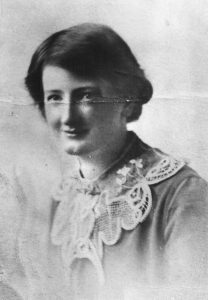
21.01.2019
We are working alongside Mid Pennine Arts to get some of Ethel’s poems on the poetry archive. Some of her work will be accessible via the Poetry Archive . This is an online resource where poems are read by the poets who wrote them – if they are still alive – or if not, by actors / people who can represent the authorial voice authentically. This is a fantastic resource so watch this space over the next few months for more updates!
14.01.2019
Dominic and Martin had a good day on Friday last week – they were out and about visiting Lancashire Archives, Preston and Blackburn Library. With the help of Mary at Blackburn Library we were able to view and read up on Ethel Carnie through newspaper clippings from the early 1900’s – some of which you can see here: Ethel Carnie Holdsworth Newspaper Extracts
They also discovered a lovely picture of Ethel, a copy of the England & Wales Census of 1911 with her Ethel mentioned on, some great poems and a fantastic book of children’s short stories which we hope to share with St Andrews Primary School and Oswaldtwisitle Civic Theatre.
10.12.18
For those of you that would like to know more – please see below for a brilliant summary of Ethel and her work. This has been shared with us by reading facilitator Janet Swan and the team at Mid Pennine Arts:
Ethel Carnie Holdsworth
Reader, writer, poet, pacifist, suffragist, Co-operator, educator, believer in the goodness of the human spirit and the powerful effect of beauty and freedom upon it.
In 1932, when Ethel Carnie Holdsworth was 46, she was described as “an ex mill girl who became a literary celebrity”: she had written 10 novels, 15 serials, 2 films plus short stories, essays and poems, mostly with the theme of injustice for women and for working people in general being at their heart, but also with a strong sense of nature and what working people were missing out on because of the slavery of working life.
Some facts of her life
Ethel Carnie was born on 1 January 1886, at 80 Roe Greave Road, Oswaldtwistle. Both her parents were cotton weavers. By 1892 she had moved to Great Harwood and attended the nonconformist Great Harwood British School. We know that she also used the Great Harwood Co-operative Lending Library throughout the time that she lived there and was extremely well read as a result. Here she talks of what it meant to find the time to read at the library (of which the newsroom was part): ‘As a half-timer, I have waited my turn in queues at the top of the newsroom stairs, and have often had to be content with four hours sleep’
In 1897, at just 11 years of age she started work as a half-timer as a “reeler” at Delf Road mill and from 1899 (aged 13), having been taught the art of “winding” she worked full time as a “winder” and later a “warper and beamer” at St. Lawrence mill. This she did until 1908 (aged 22), and Roger Smalley argues that she and other women would have been paid the same as a man at this time. Important to note the effect of this on her self image / self belief – especially as not only was she being paid an equal wage, she was also surrounded by other women who would have been earning the same. This may have had a very large impact on Ethel’s ability to write and ultimately be able to stand up and address large audiences.
But this wage was not always available. Ethel would certainly have known one of the many depressions that caused widespread hardship. In addition Ethel’s parents split up in 1901 so Ethel was also living in a single parent family with her mother and brother – now in Great Harwood. She would also have known about the harsh conditions of working in the mill – but for Ethel there was an escape route – she used her imagination to write poetry from an early age.
In 1905 Ethel attended Social Democratic Federation (SDF) and Independent Labour Party (ILP) meetings in Burnley and Blackburn. She no doubt attended many others because in 1908 she became a member of the ILP. Here she would also have heard songs and poems – useful for the working man and woman – many of whom didn’t read.
So Ethel wrote, and in 1906, one of her earliest poems The Bookworm (a rapturous depiction of “the world of books” and how the printed word could be used to enact change) and other poems were published in local newspapers (and later in pamphlets that were distributed in Lancashire mills e.g. Voices From The Loom). They drew the attention of W.H. Burnett from the Blackburn Society of Authors, who in 1907 sponsored 500 copies of her first book “Rhymes from the Factory”. Because of interest nationally and internationally, the first edition sold out within a month and soon republished.
By 1909 her work had been published in Women’s World, The Red Letter, Homer’s Weekly, The Co-operative News, The Millgate Monthly and Clarion as well as in local papers. A favourable review of Rhymes from the Factory in the magazine, The Woman Worker, prompted its proprietor, Robert Blatchford, to offer her a job on the staff of The Woman Worker and she accepted. After nine years at St. Lawrence mill she went to London to begin the most important part of her pre-war journalism – writing a column under the title The Editor’s Chair and other pieces.
Quote from one of her articles e.g. “For God’s sake, women, go out and play. Instead of staring round to see what wants polishing or rubbing, go out into the open and draw the breath of the moors or the hills into your lungs. Get some of the starshine and sunlight into your souls, and do not forget that you are something more than a dish washer – that you are more necessary to the human race than politicians – or anything”.
After falling out with Blatchford (probably over matters of politics and representation), Ethel returned to East Lancashire. In 1911 a second collection of poems entitled Songs of a Factory Girl, and in 1913 a selection of children’s stories first issued as Books for the Bairns, but now collected under the title The Lamp Girl and Other Stories, were published. They were followed by her first novel, Miss Nobody, also in 1913, and a third volume of verse, Voices of Womanhood, in 1914. All were produced under difficult circumstances – between serving customers at the draper’s shop her mother had taken in Little Harwood, between lectures at Owens College, Manchester, where she registered as a non-degree student from 1911 to 1913, and between the creative writing classes she taught at Bebel House in London in 1913 and 1914. There were periods too when she went back to St. Lawrence mill or sold ribbons and laces at Blackburn market.
In 1915 Ethel married Alfred Holdsworth and they lived at 76, Garnett Street, Barrowford. From there Ethel became more active in the political hotspot of Nelson – for example in 1915 she chaired an anti-conscription rally and in 1917 addressed a rally of 20,000 people at a rally calling for an end to war. Alfred, who served in WW1 was reported killed in 1918, but later returned home having been a prisoner of war. We can imagine the emotional impact of this. During this time when Ethel thought she was a widow, she moved with her daughter Margaret to lodge with the Simm family in Blackburn, but later moved to Nelson where her second daughter was born.
In 1923 Ethel and her husband were publishing a radical penny monthly called The Clear Light – an anti fascist newspaper in which, for example she warned even at this time, of the power of Mussolini.In the early 1920s Ethel’s most famous book “Helen of Four Gates” (that sold 50,000 copies when it was first published) was made into a film – shot in the Hebden Bridge area. (See BFI website).
Much later Ethel and her children moved to Manchester. She continued to write poems and short stories till 1936 and then lived alone after the marriage of her daughter. Ethel died at Crumpsall hospital at the age of 76 (28 December 1962). It has been argued that Ethel faded from view because she lacked the support common for middle class writers. See Guardian Article: Neglected women writers: this is a class issue.
If you’d like to find out even more about Ethel, then here are some more great sources to take a look at:
Big Issue article by Nicola Wilson and work done by the Pendle Radicals project
09.11.18
We are pleased to announce the start of a new project: Finding Ethel- Archivists of a Lost Historical Figure. With great thanks to Heritage Lottery Fund (National Lottery) we will be able to work with partners including Oswaldtwistle Civic Theatre, Huckleberry Films and Janet Swan. The project will focus on the literary work of Ethel Carnie Holdsworth. The work of Ethel Carnie Holdsworth is significant culturally to East Lancashire and nationally as she was the first working class woman to be published in Britain. This project will use her writing to focus on the historical and cultural heritage of the late 19th century and early 20th century in Lancashire, and particularly in Hyndburn. The project is an opportunity to use this unique source to engage people with their heritage and learn about both the cotton industry and society at that time. It also looks at how many of the characteristics of her time still apply it to modern life today.
This is a really fantastic project and, if you would like to get involved, don’t hesitate to get in touch -we’d love to hear from you. Here’s a new project logo / image of Ethel courtesy of Dominic Cooper.
